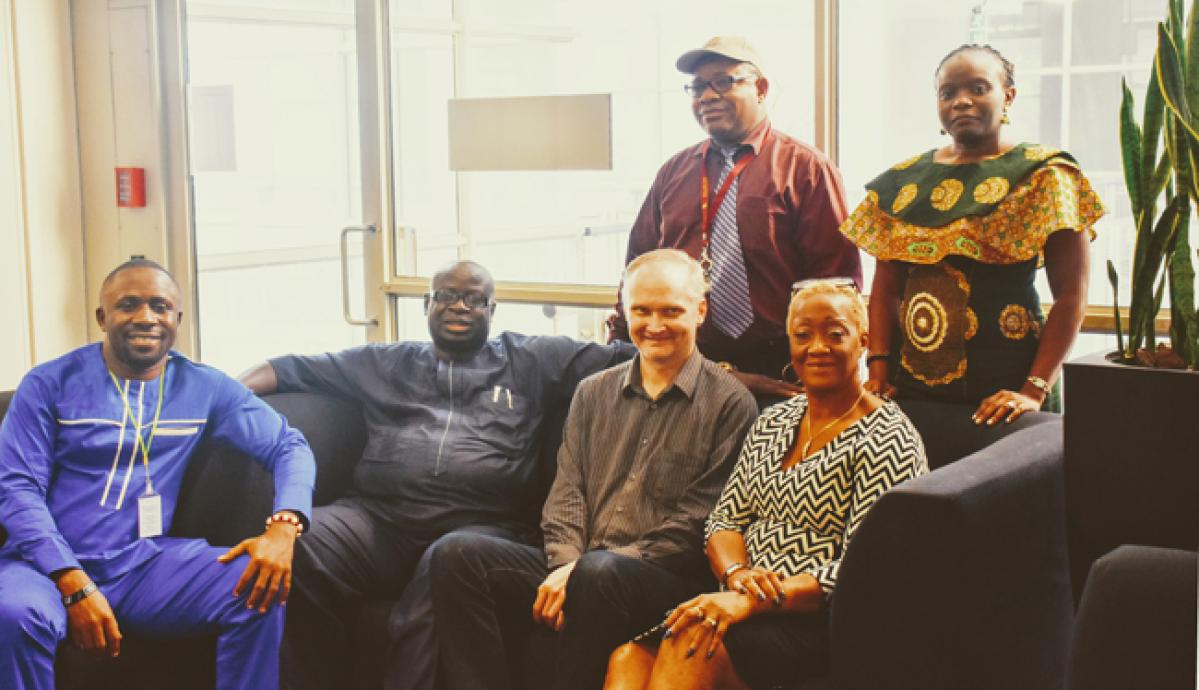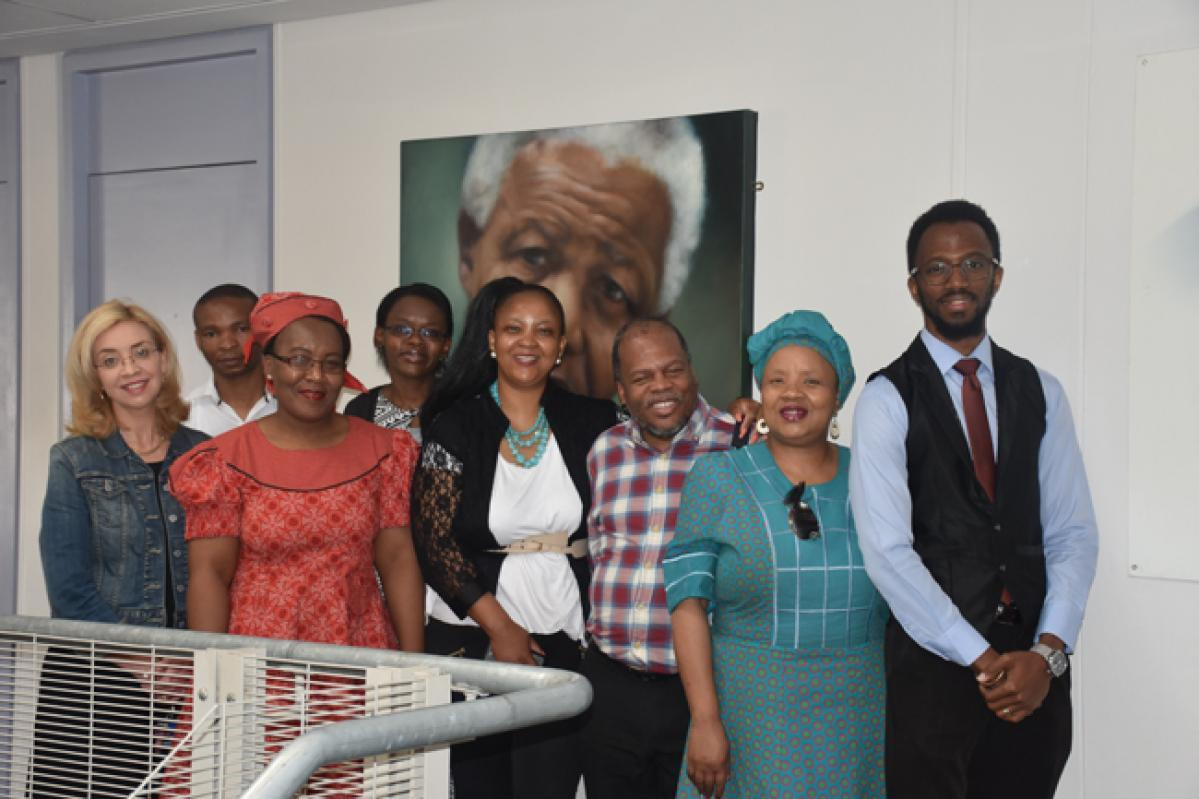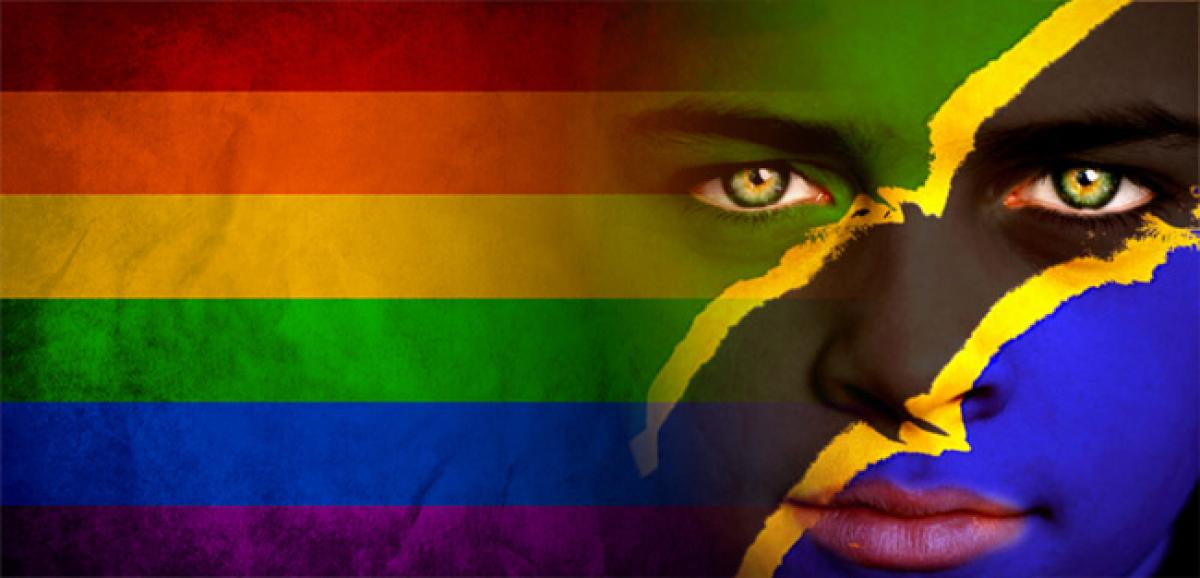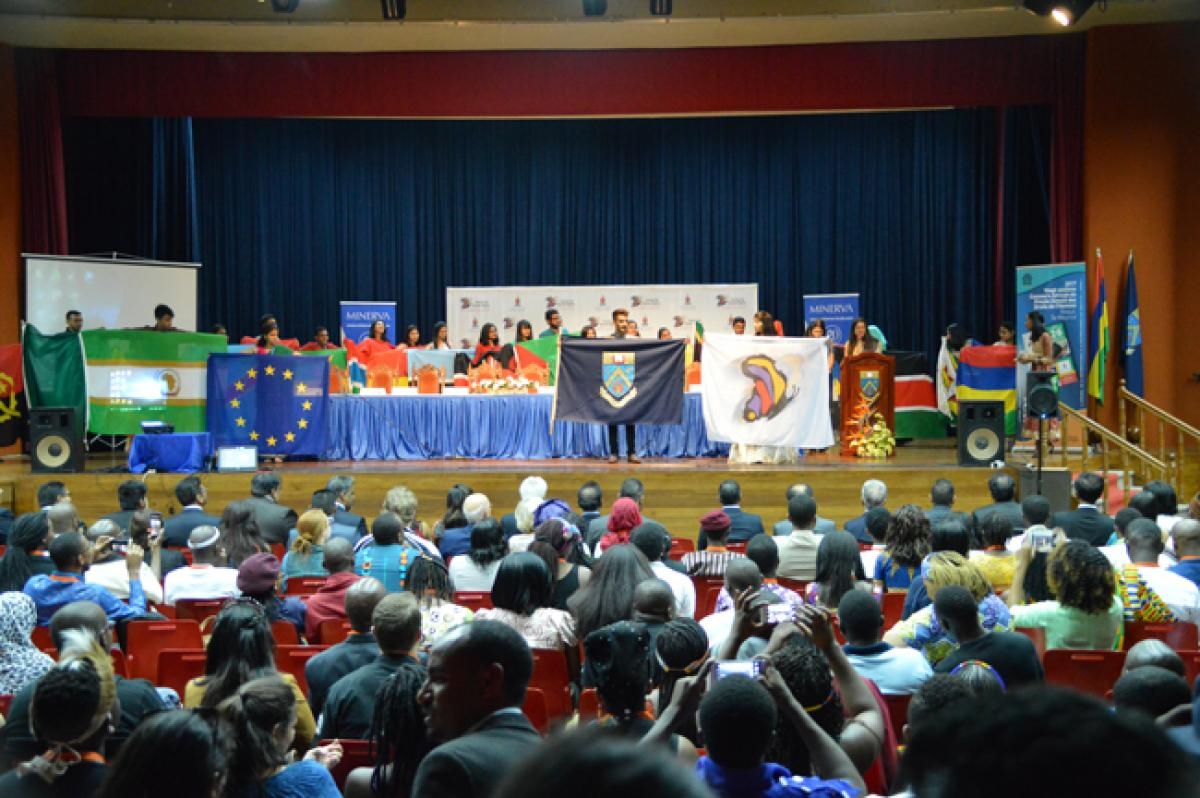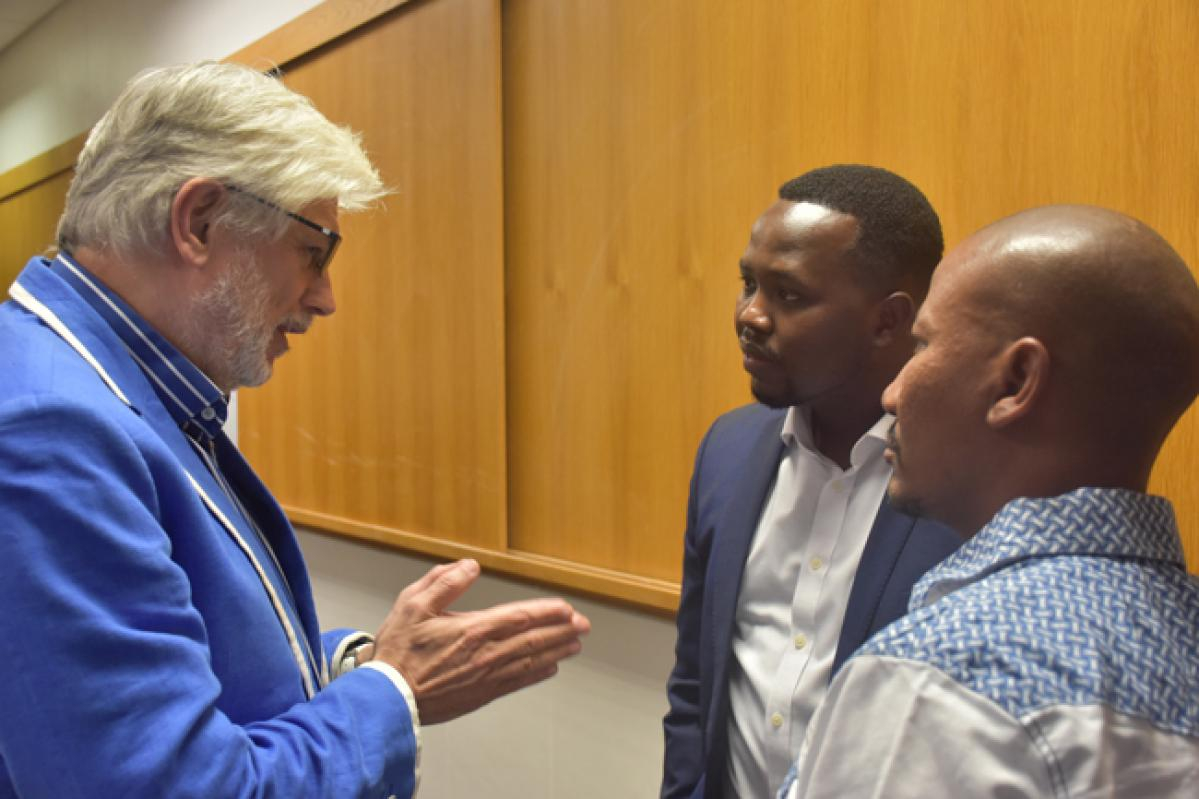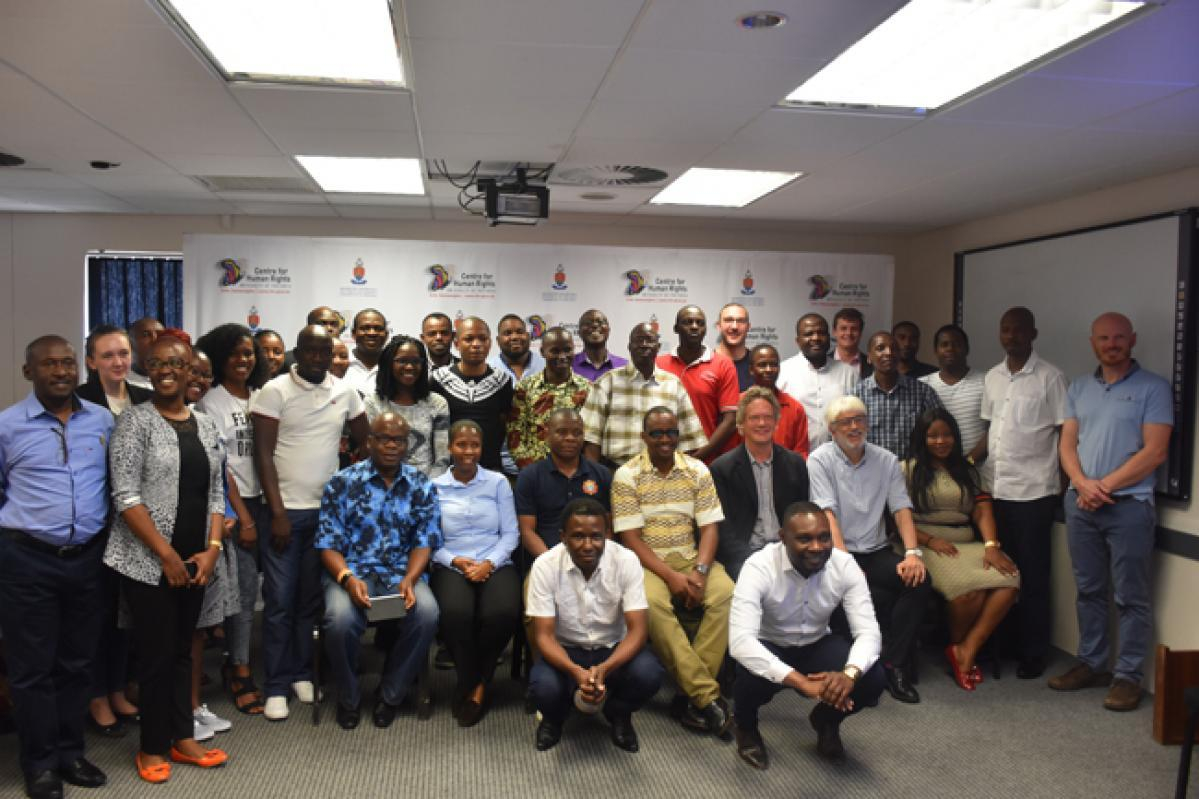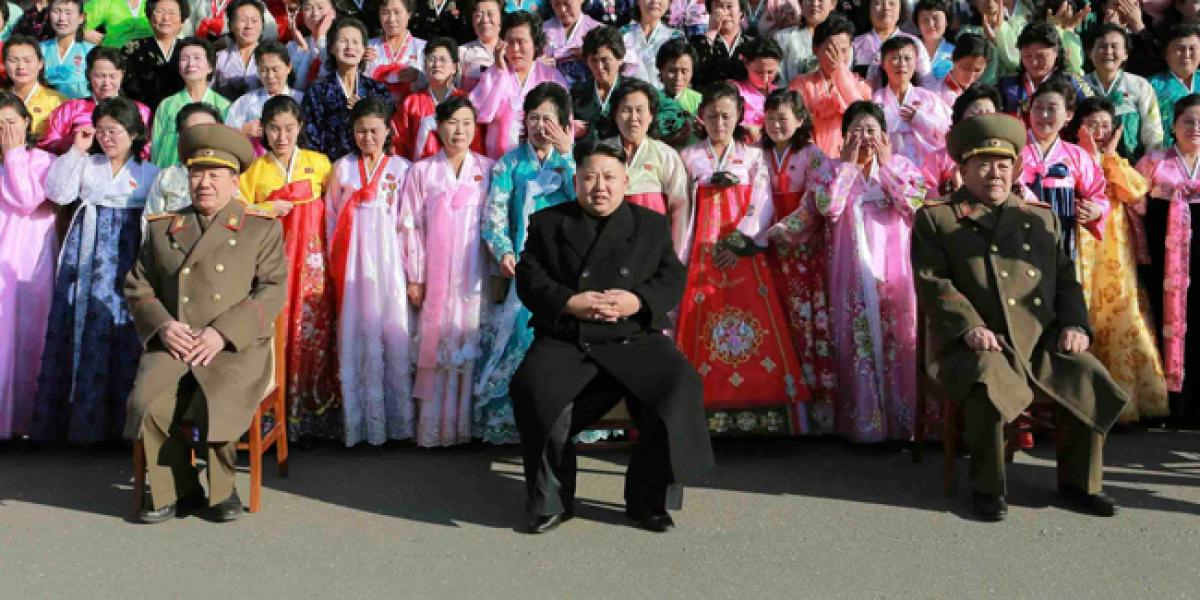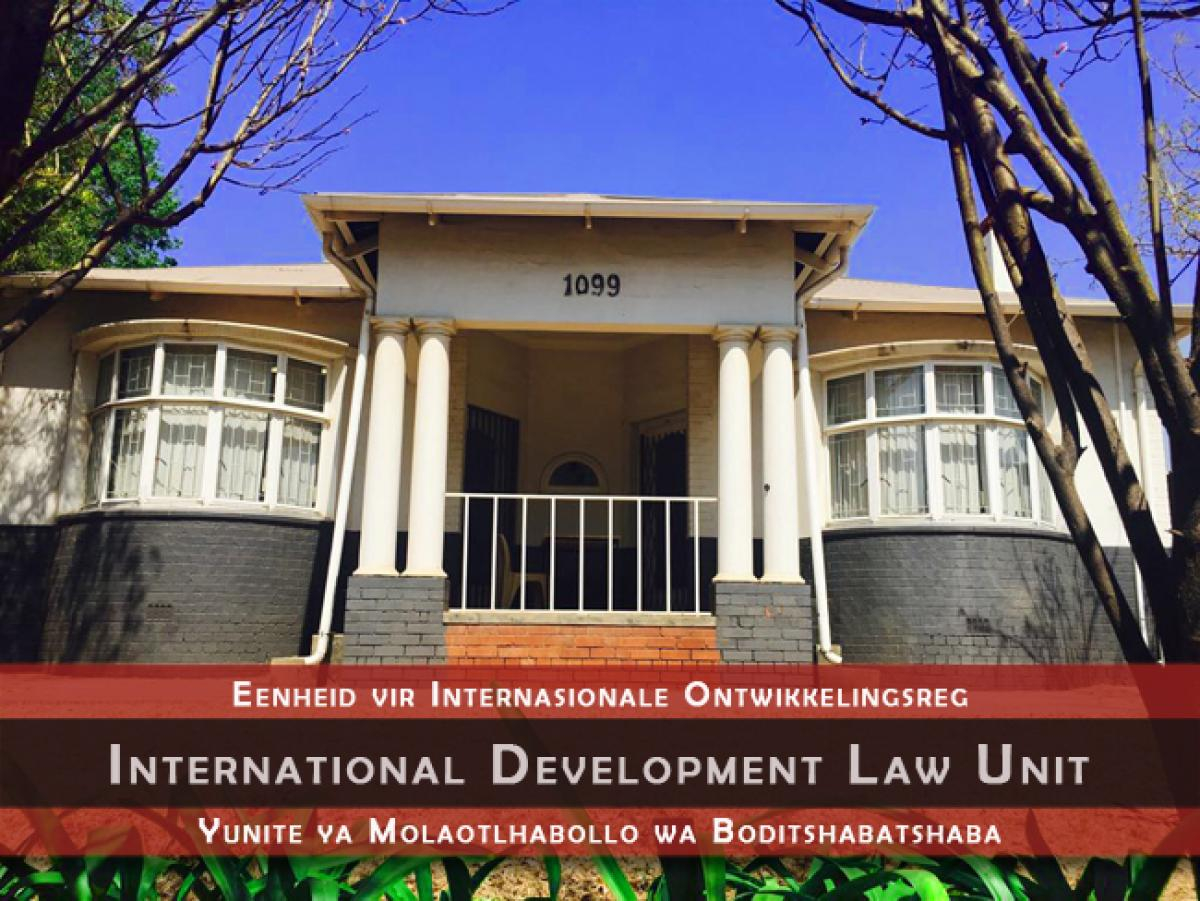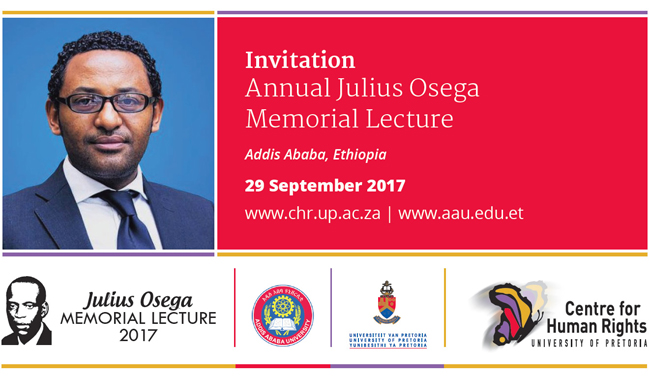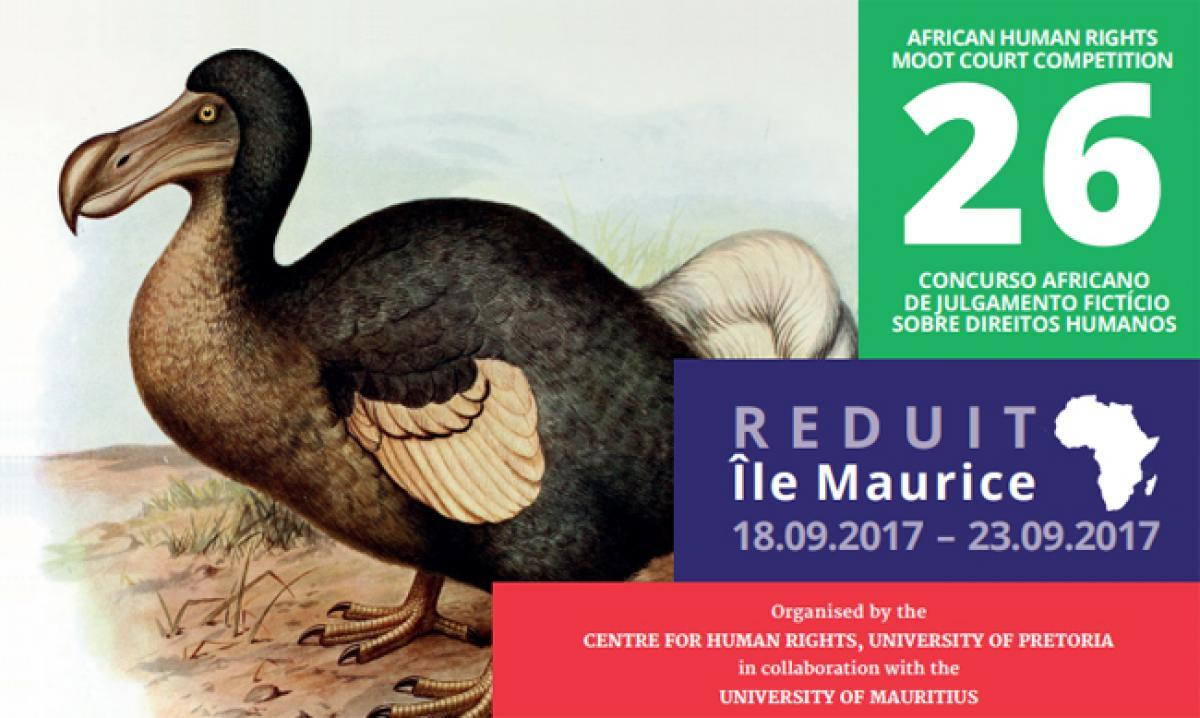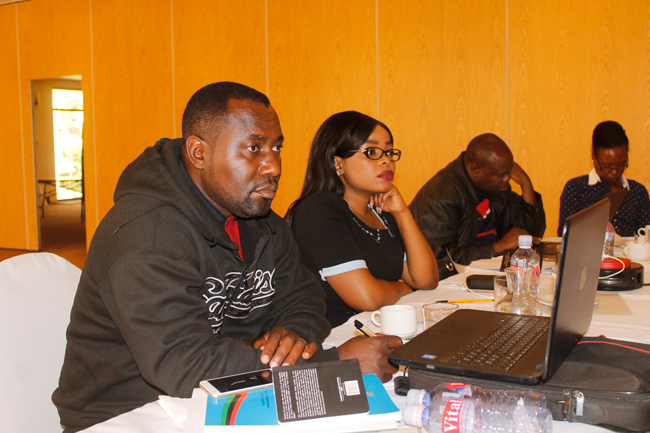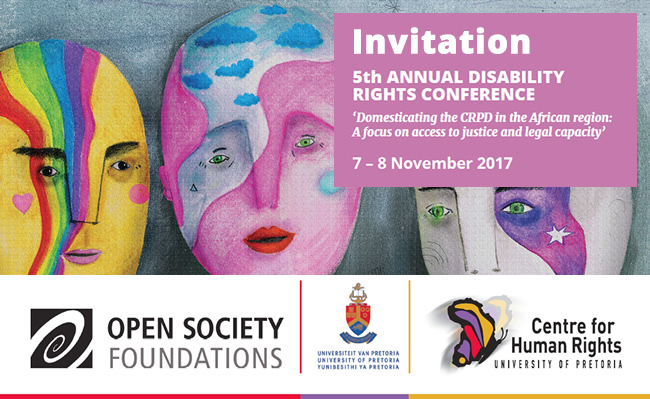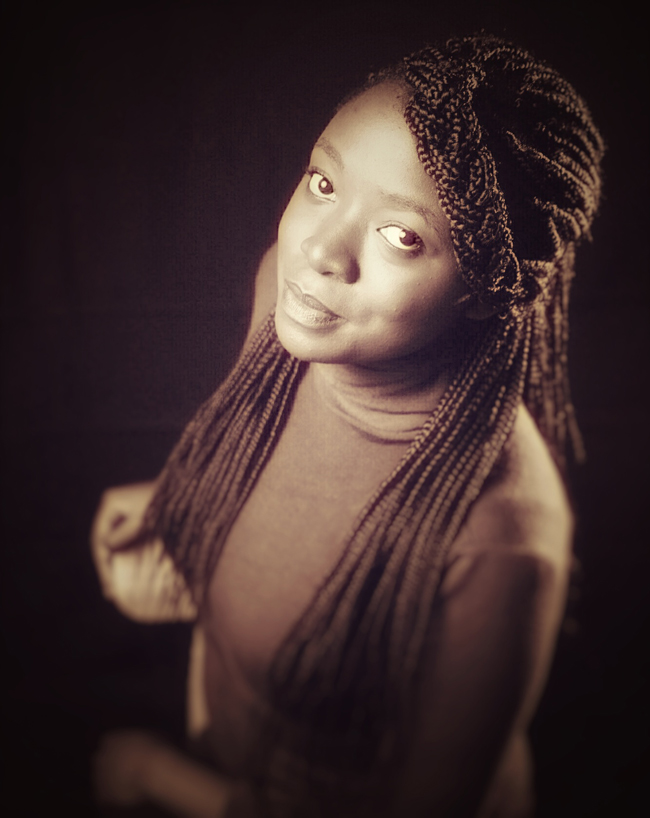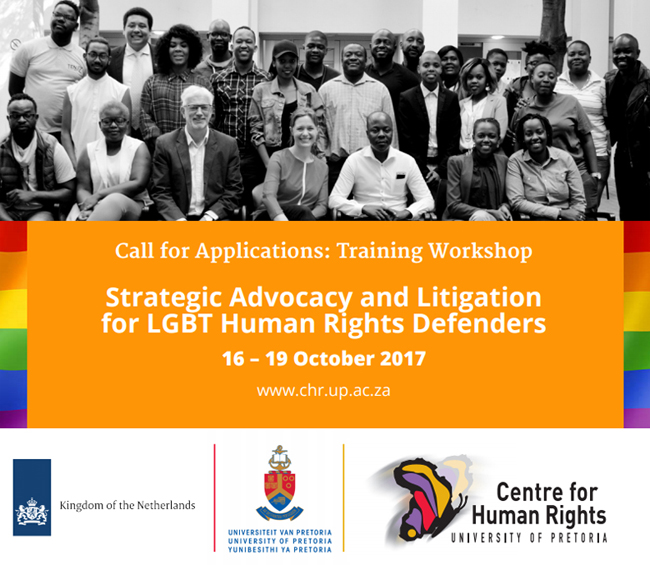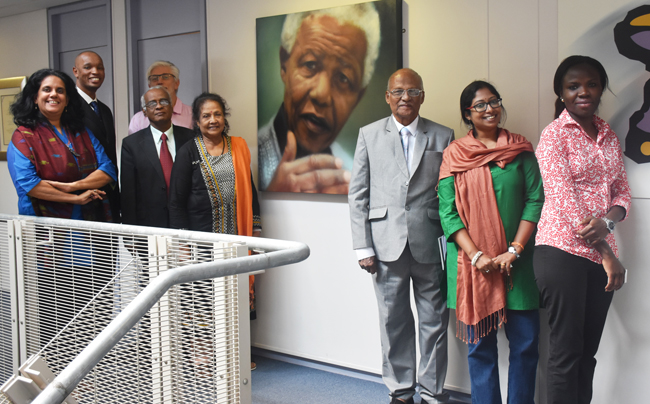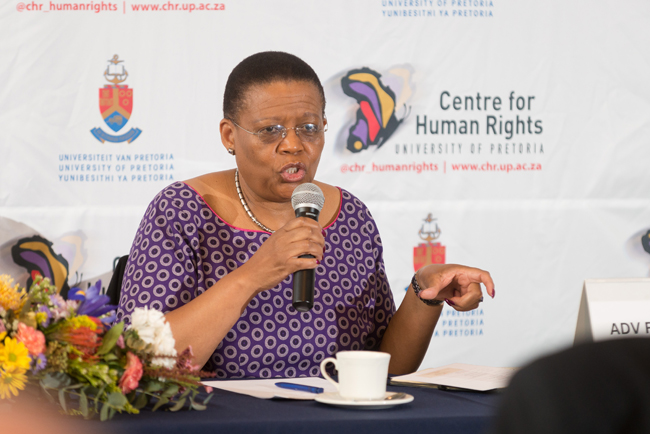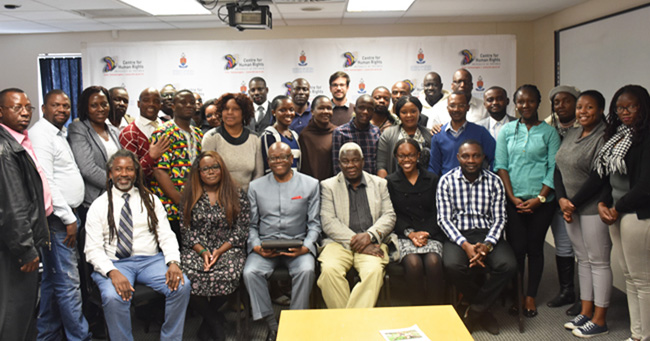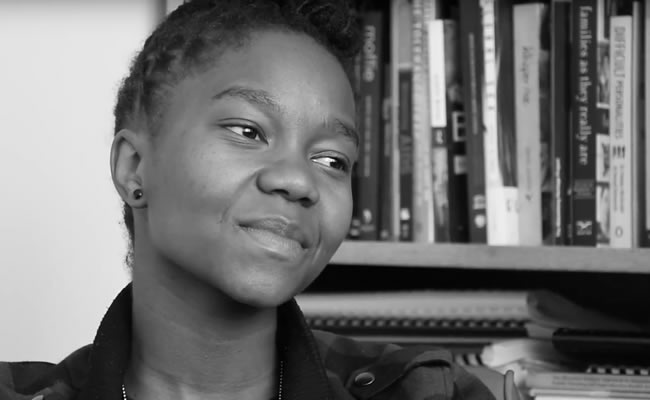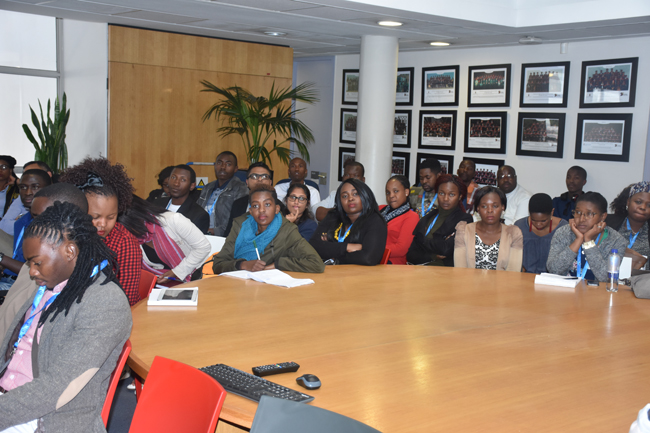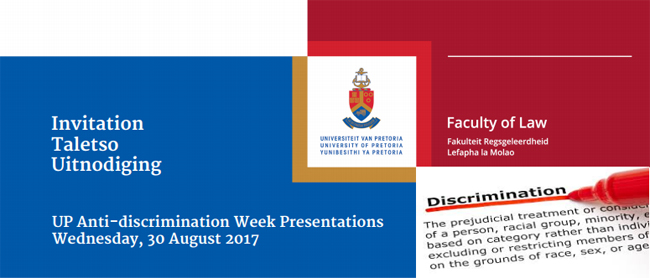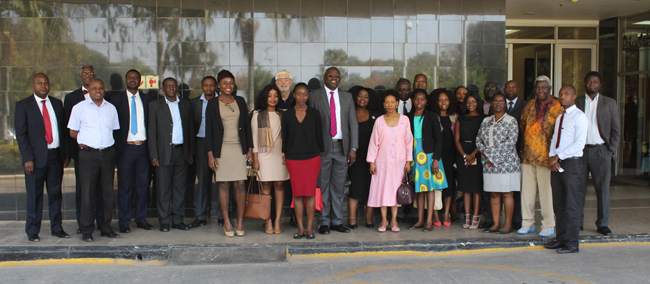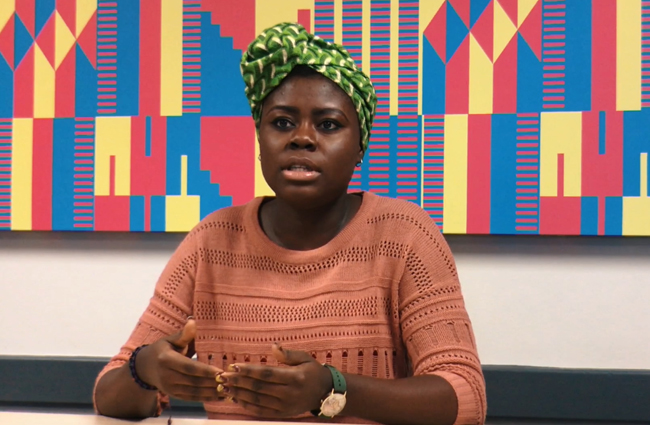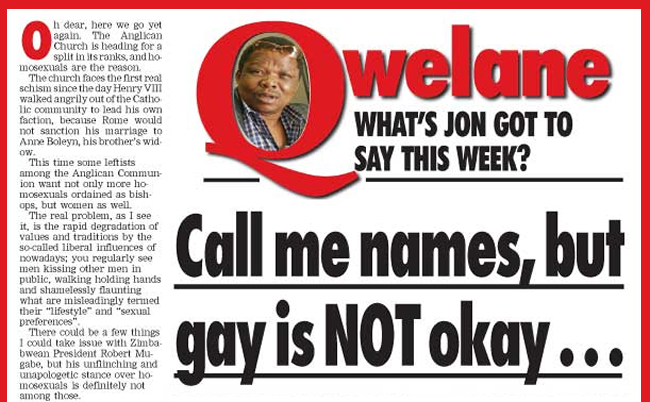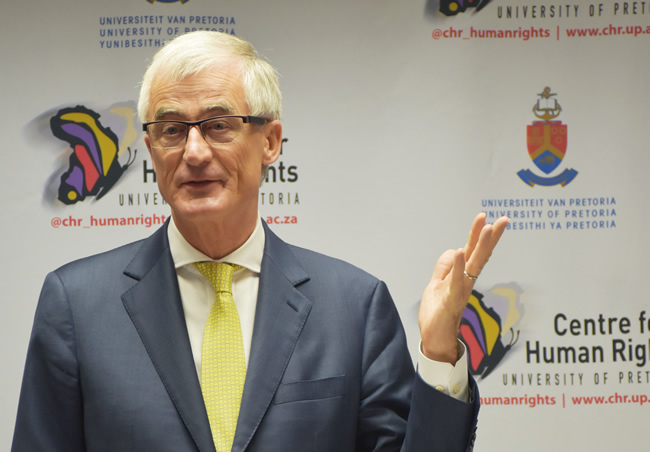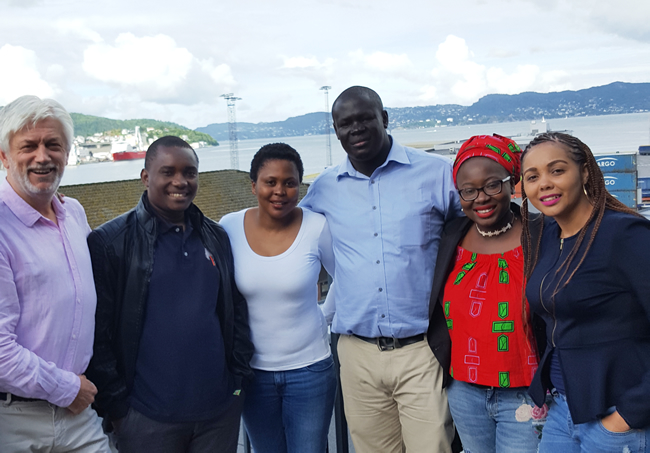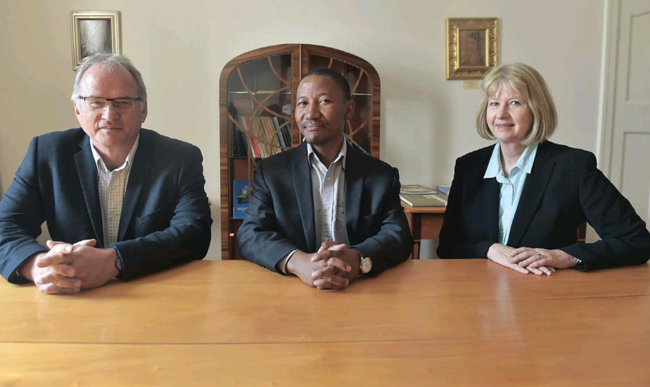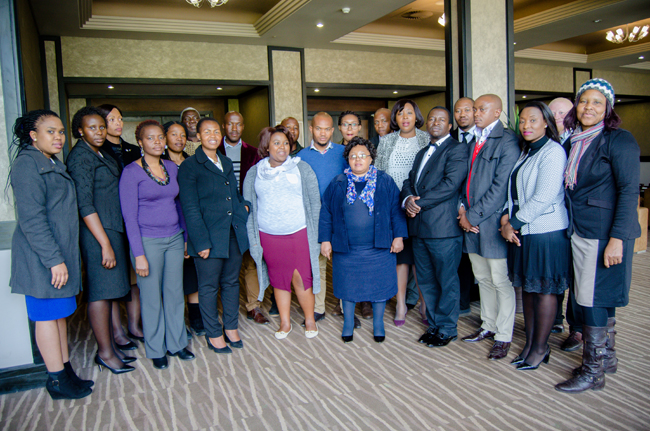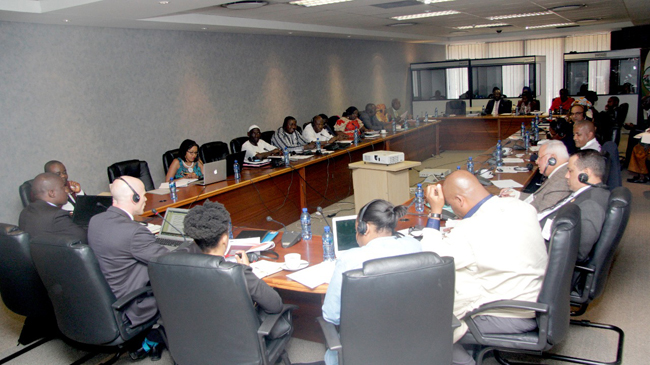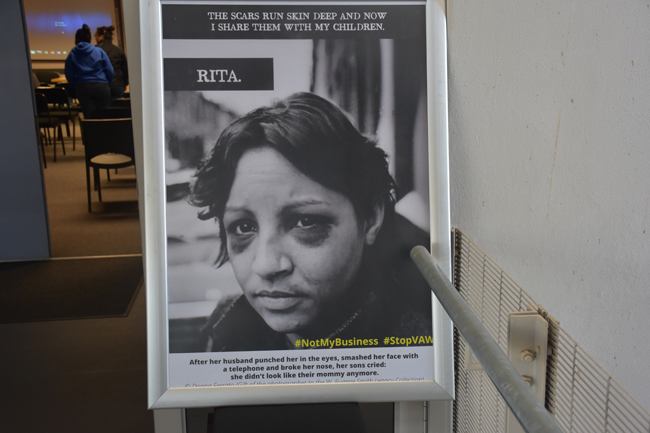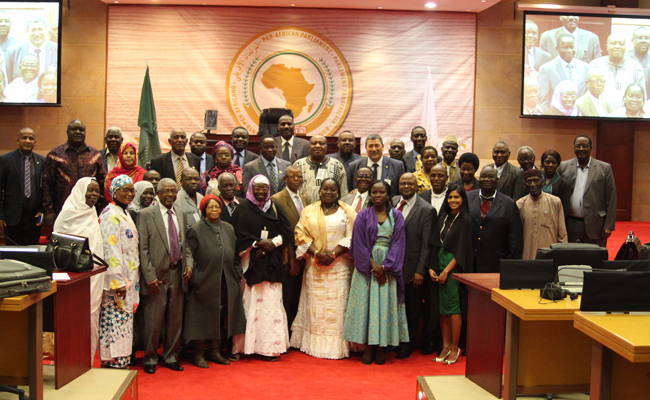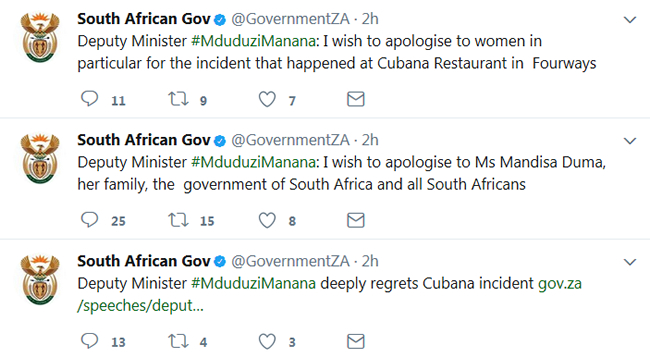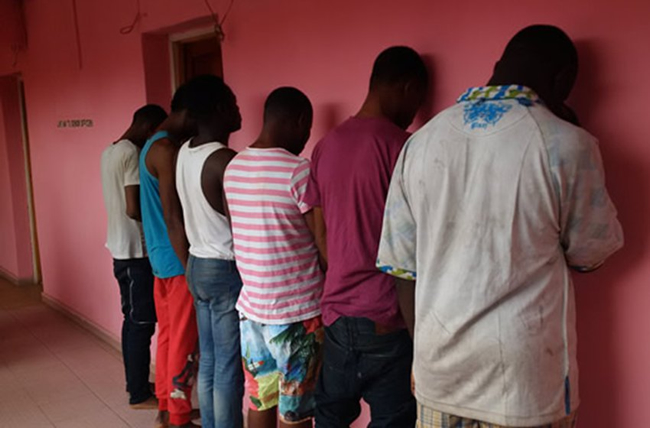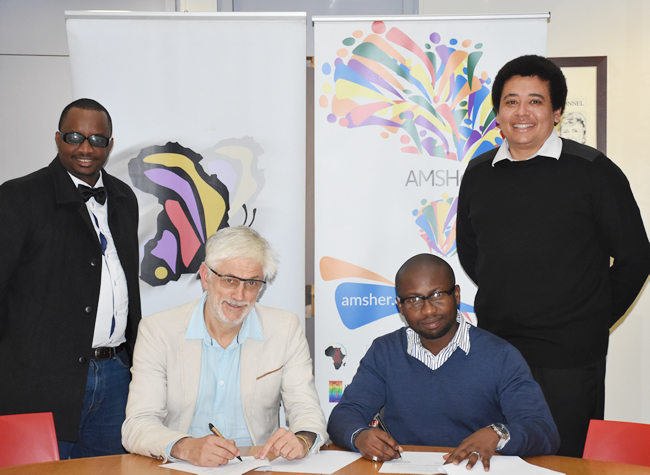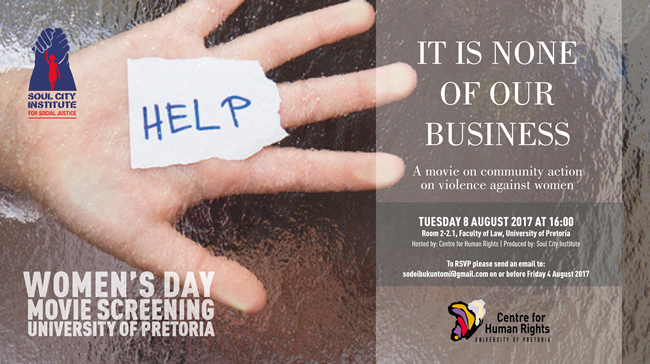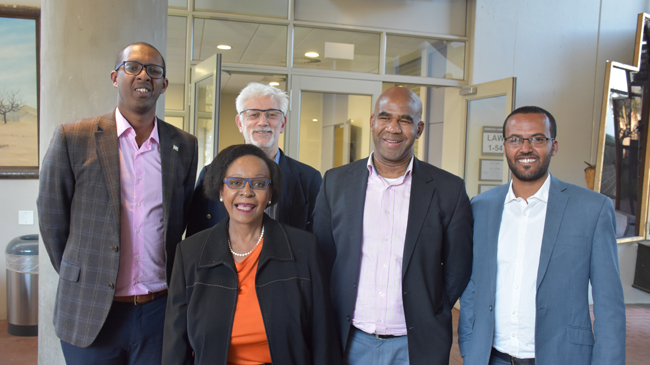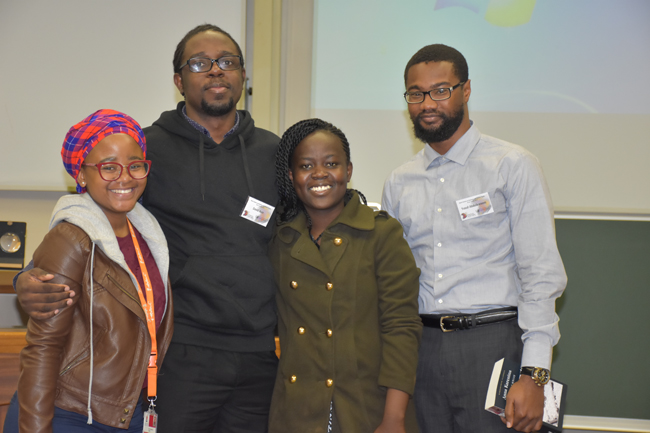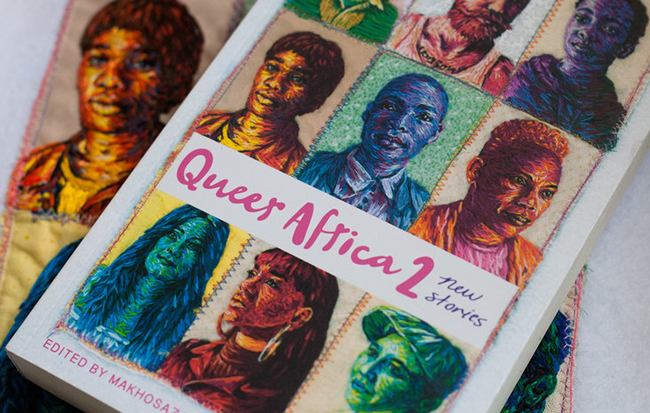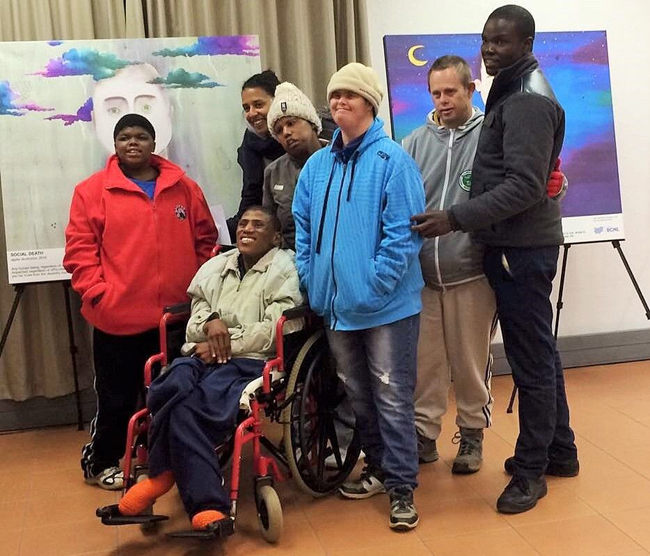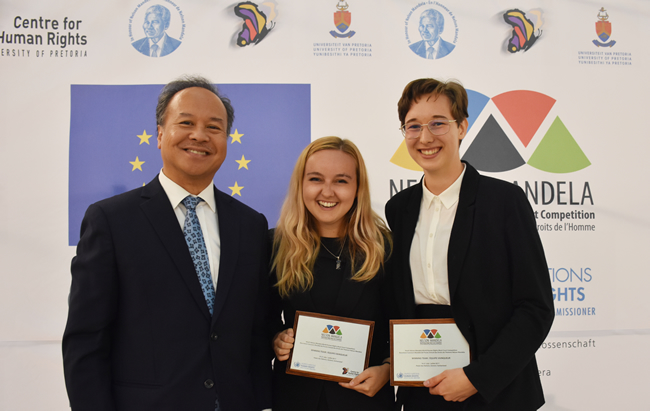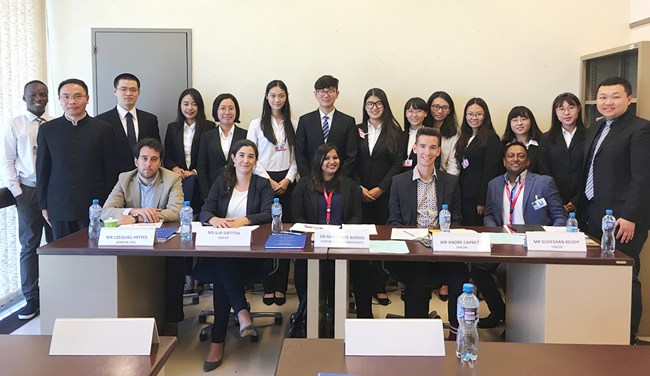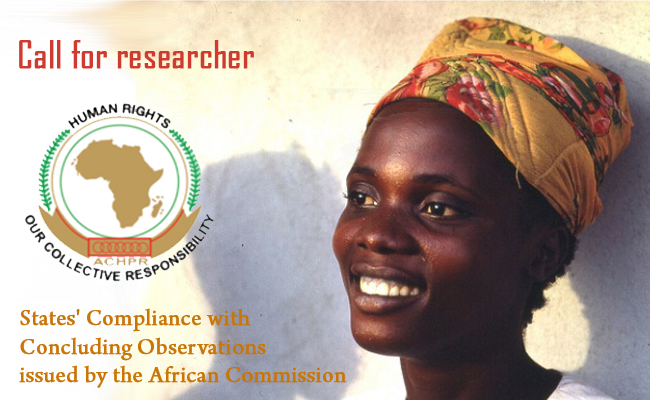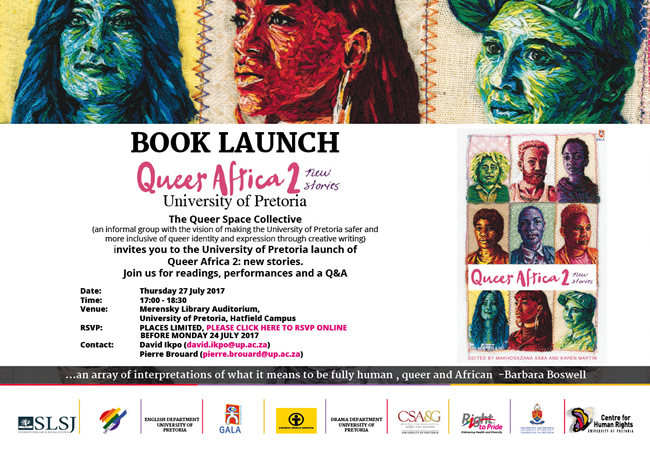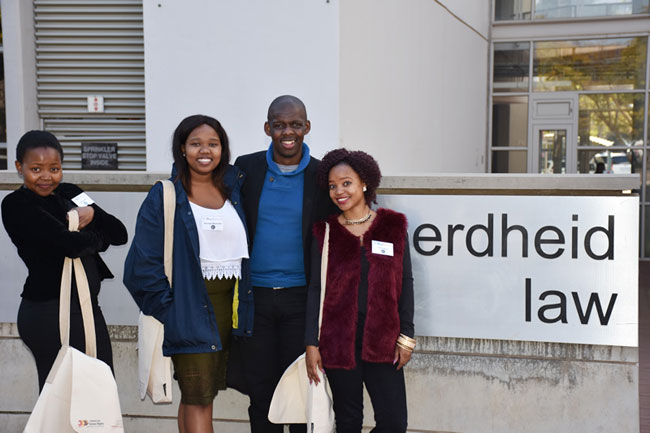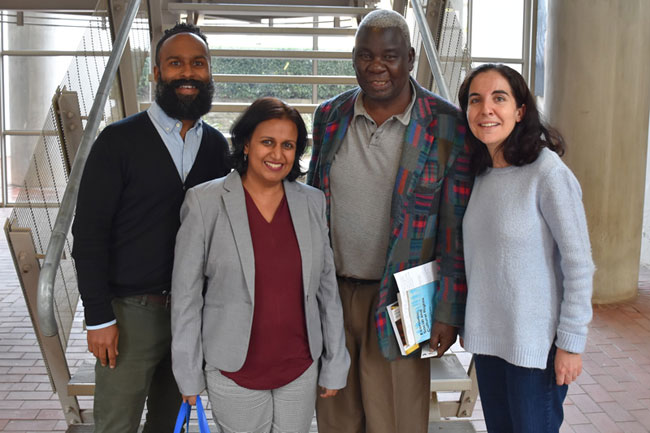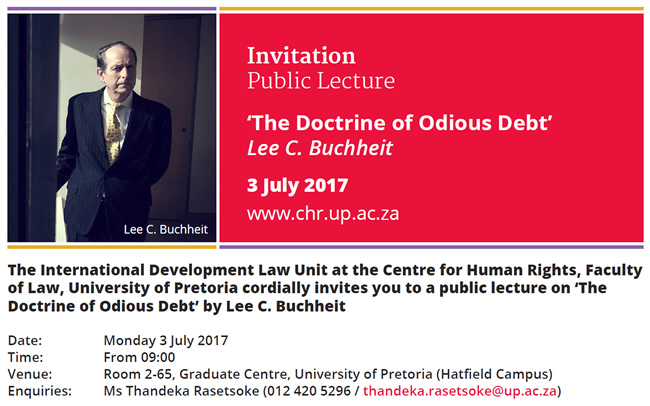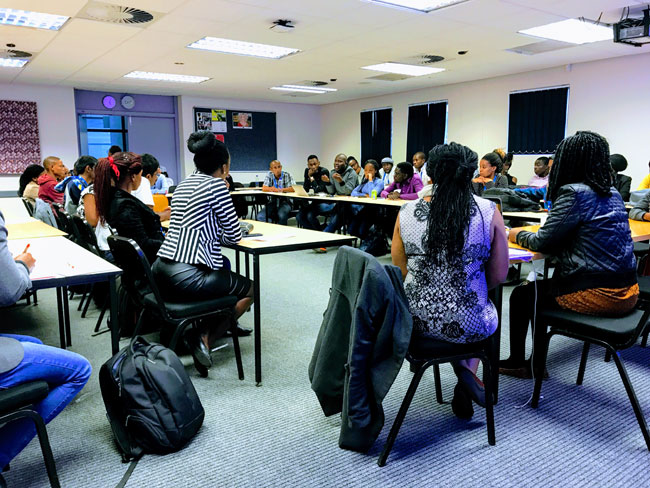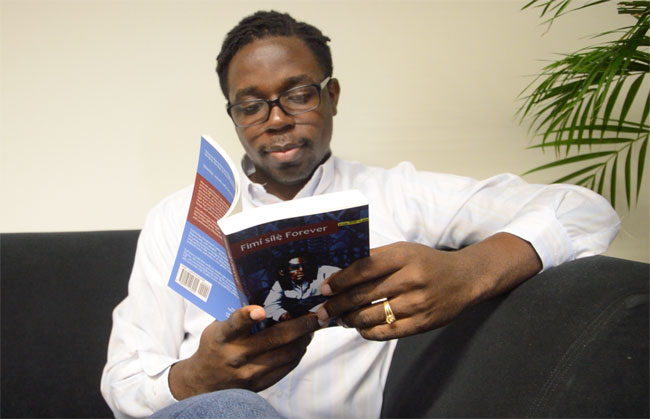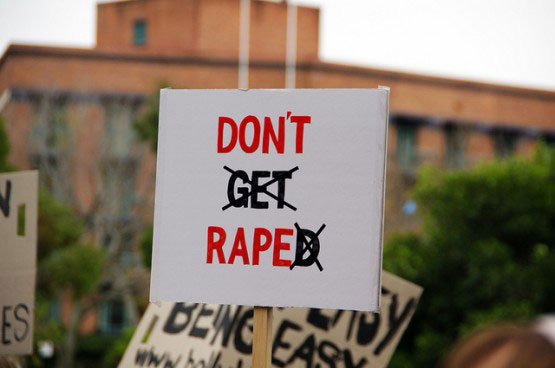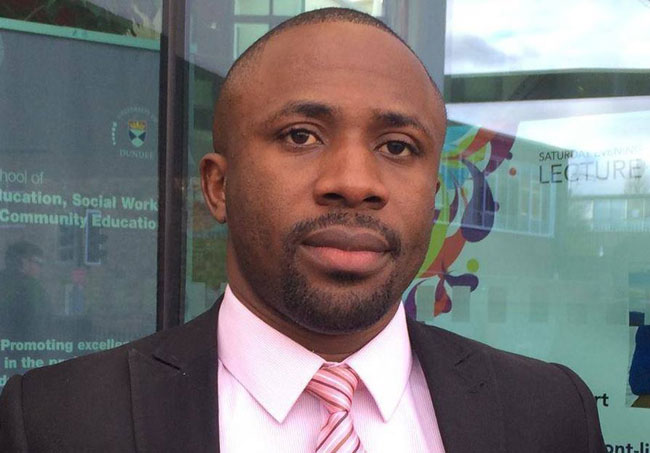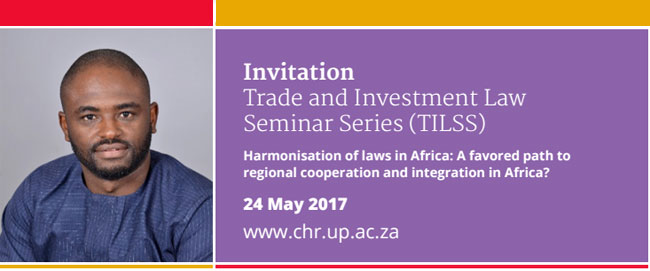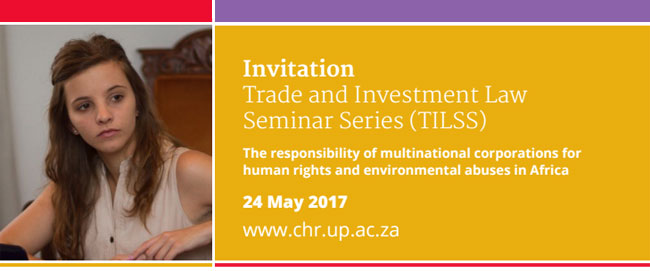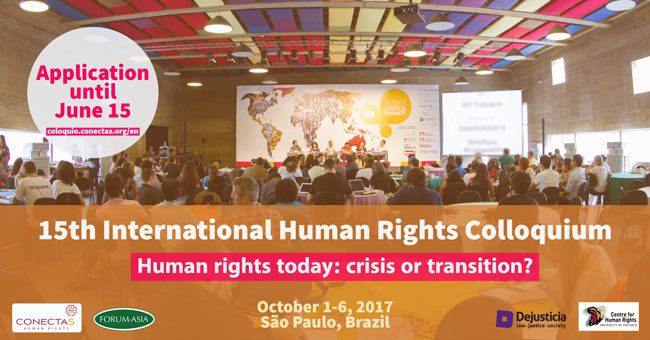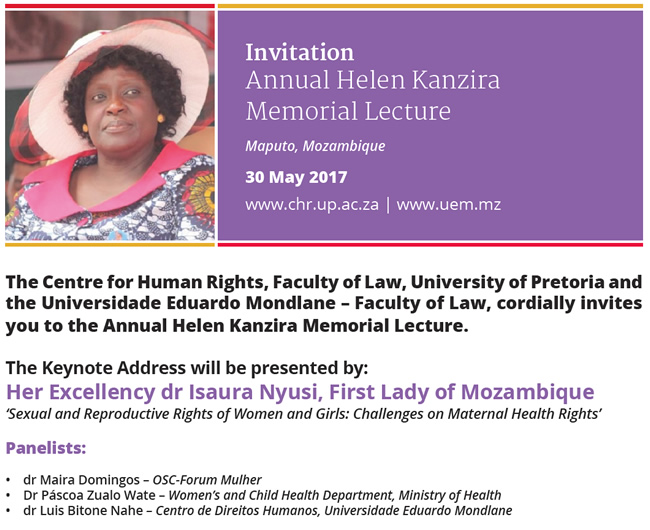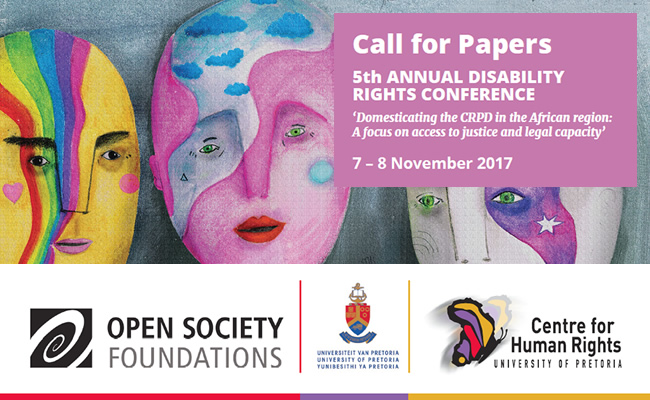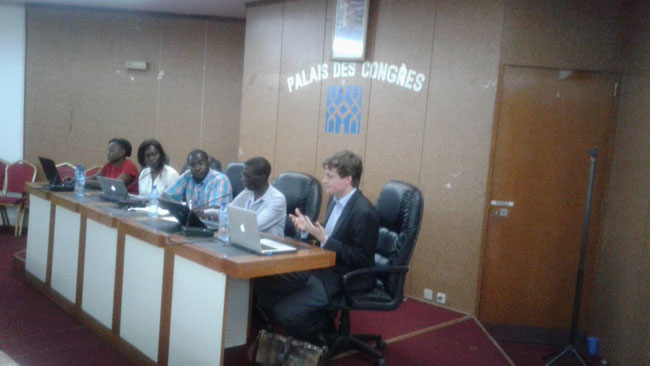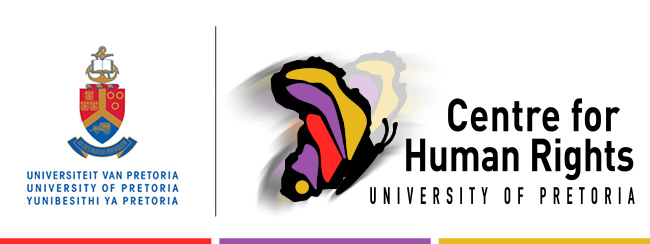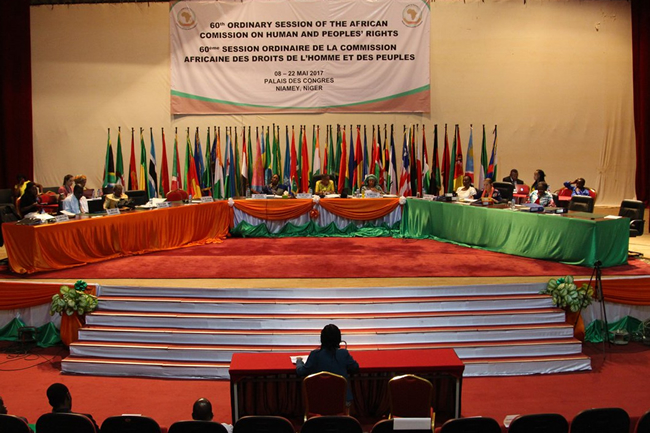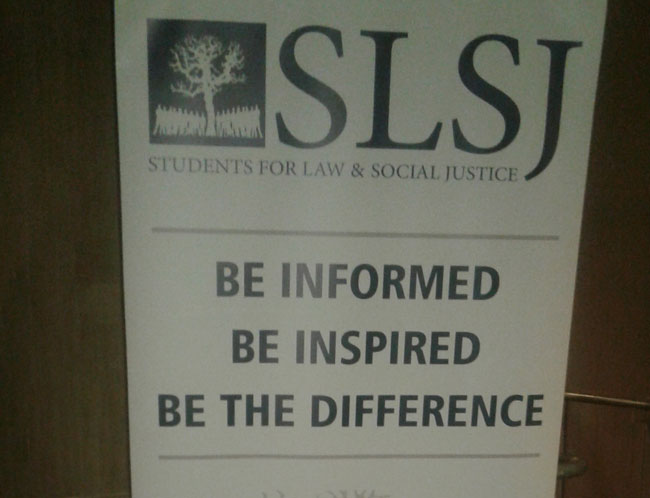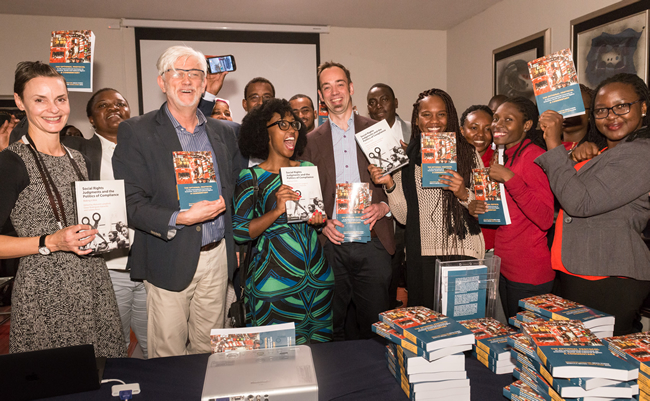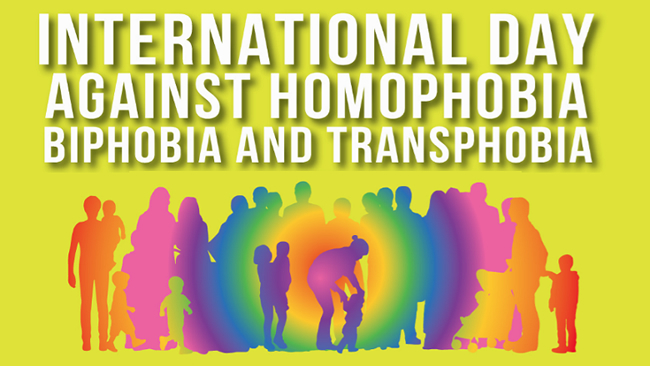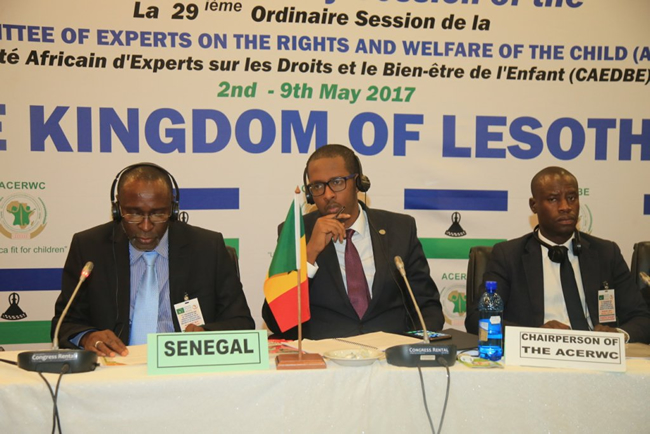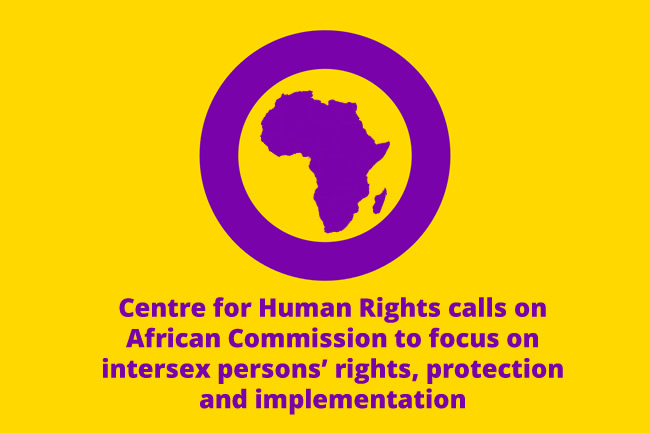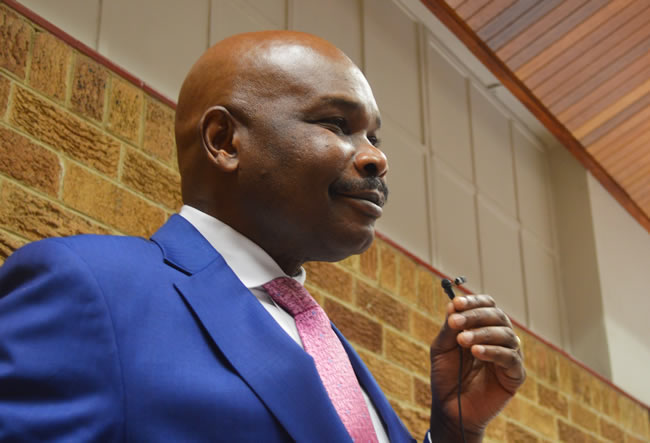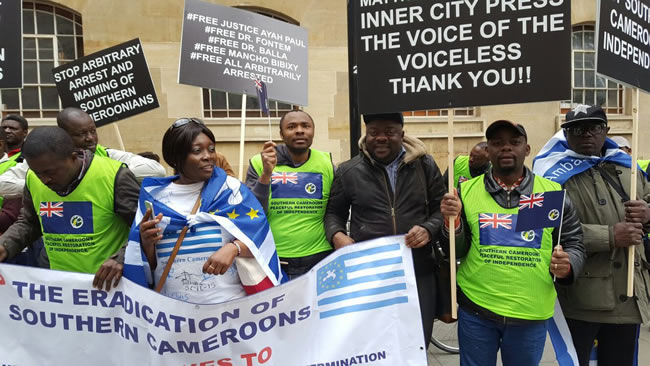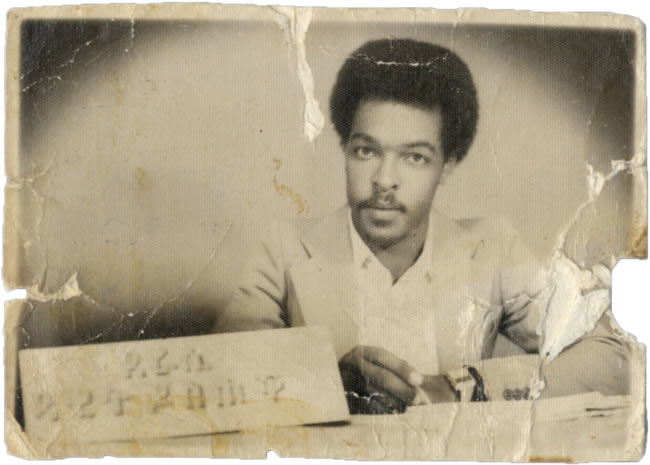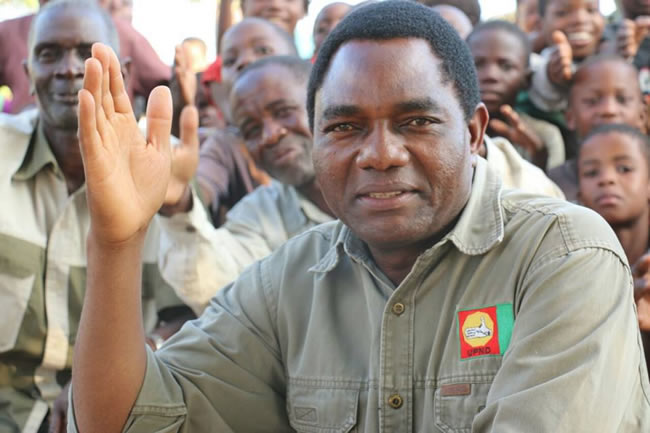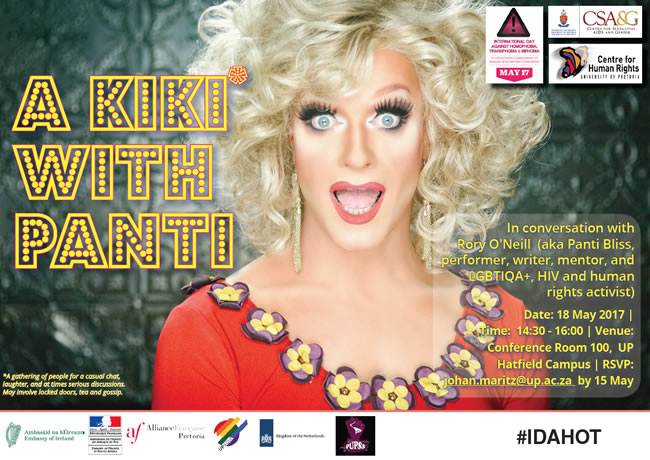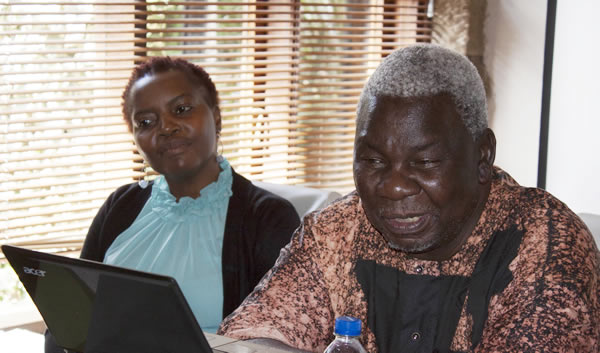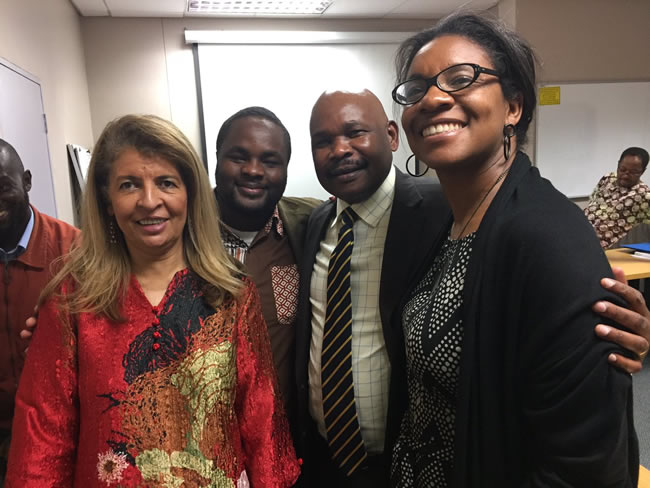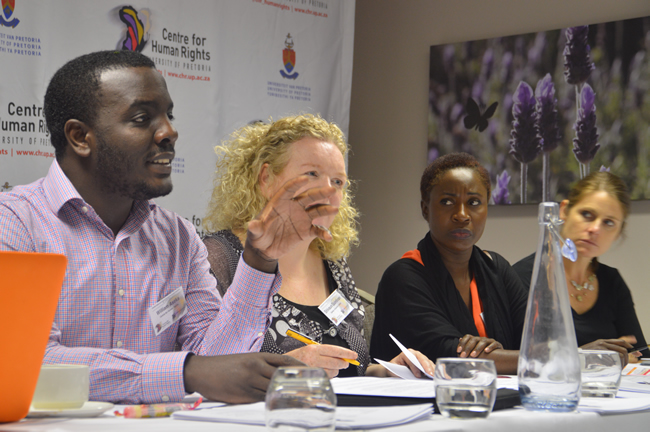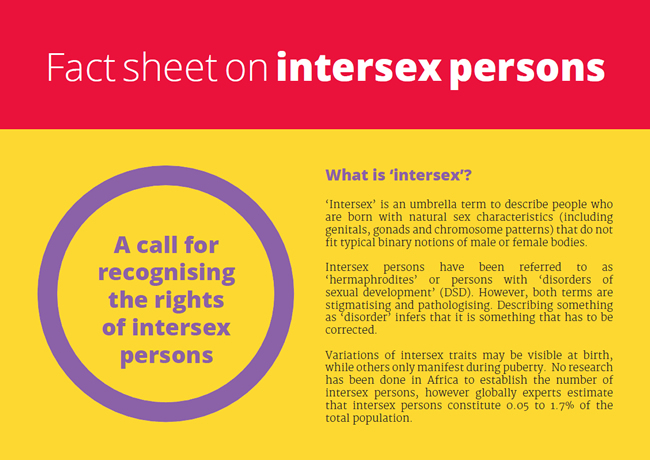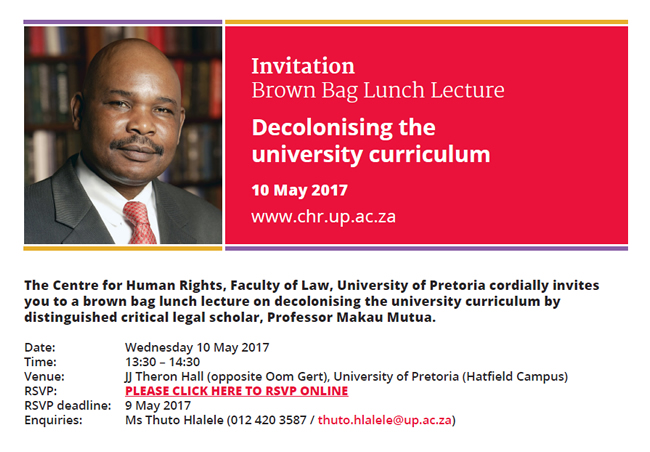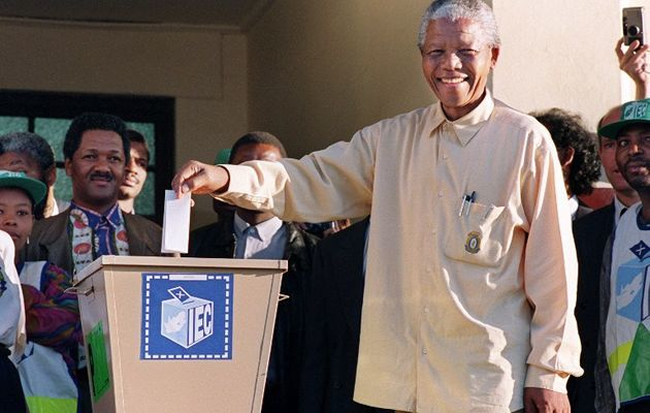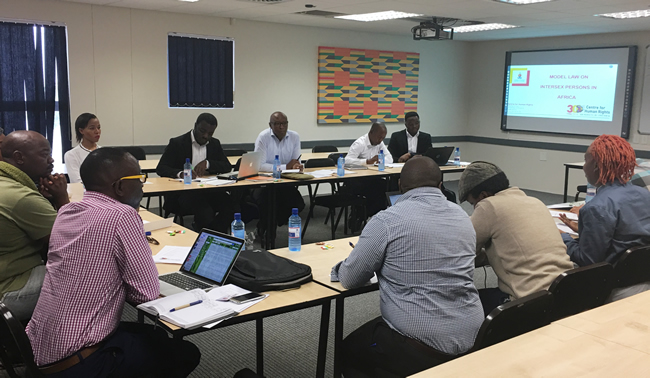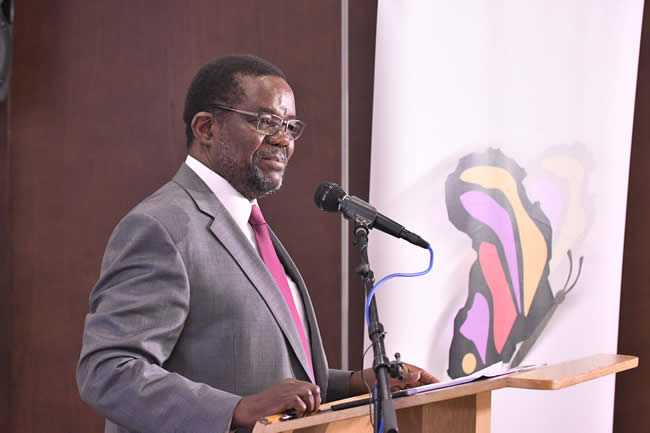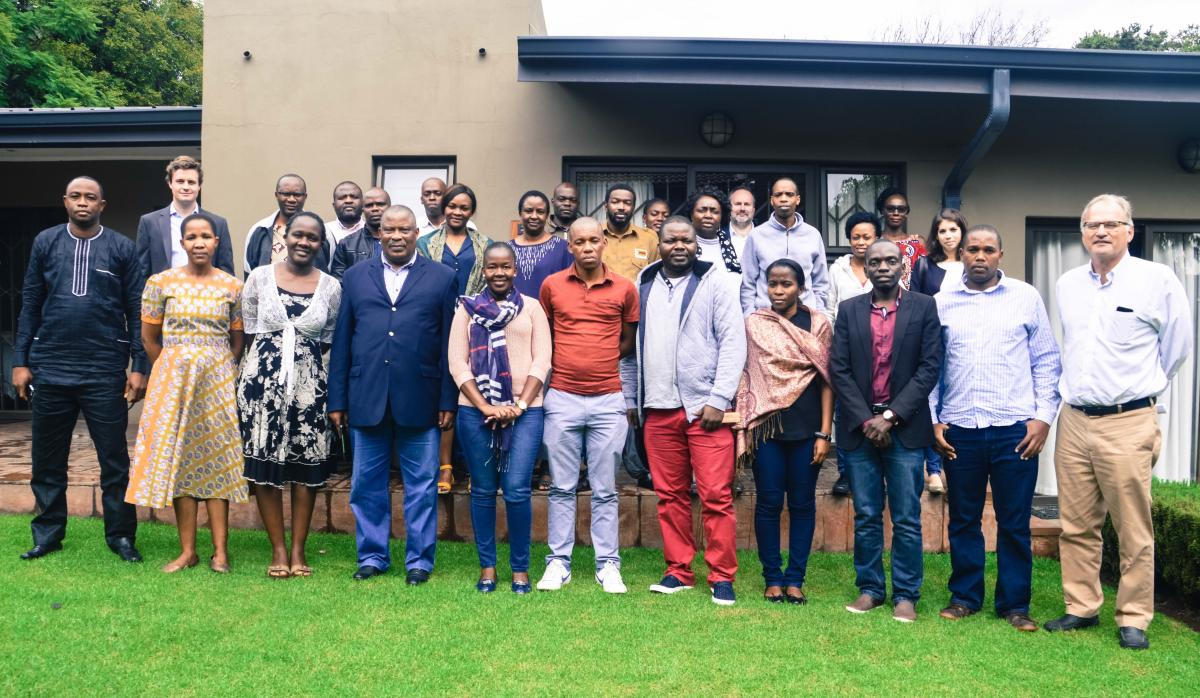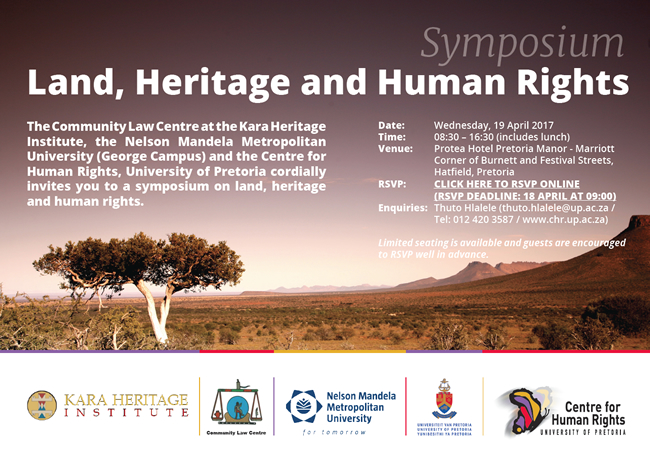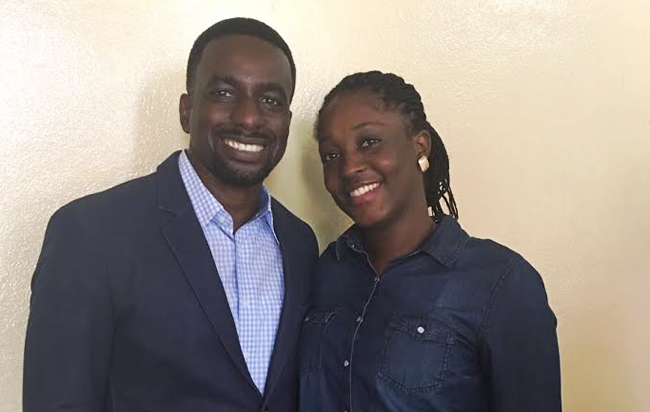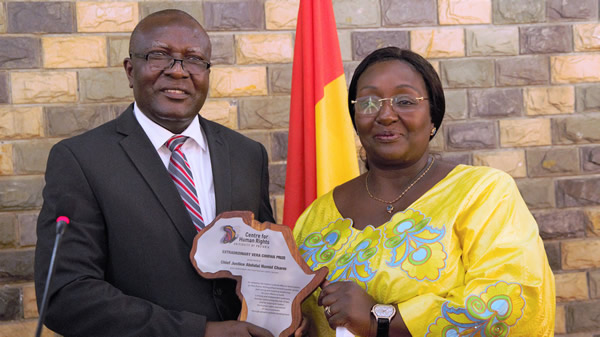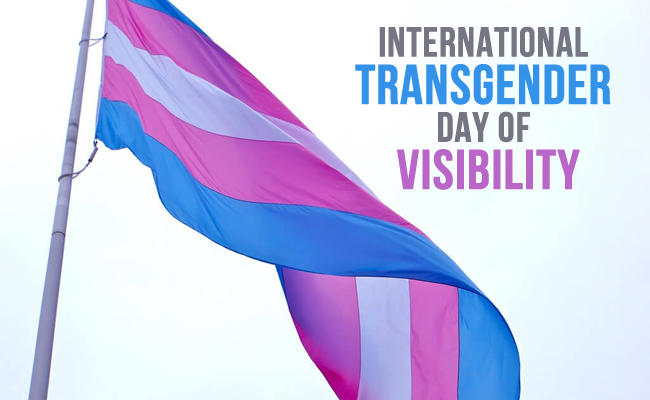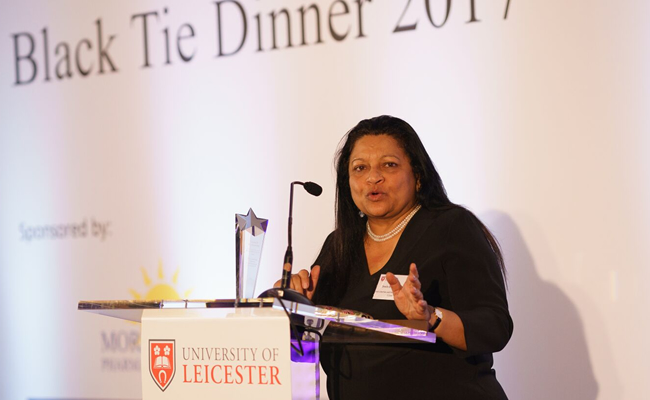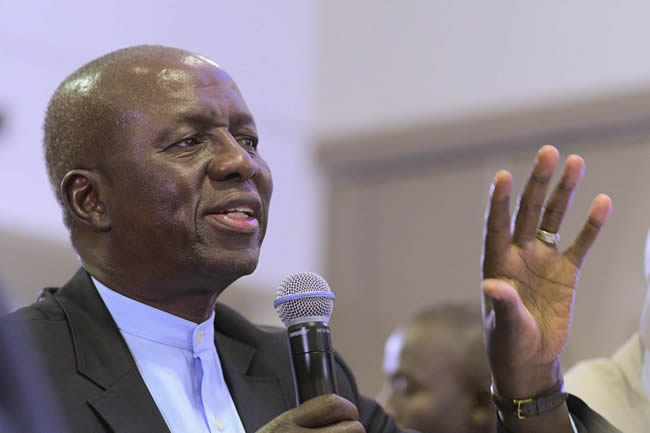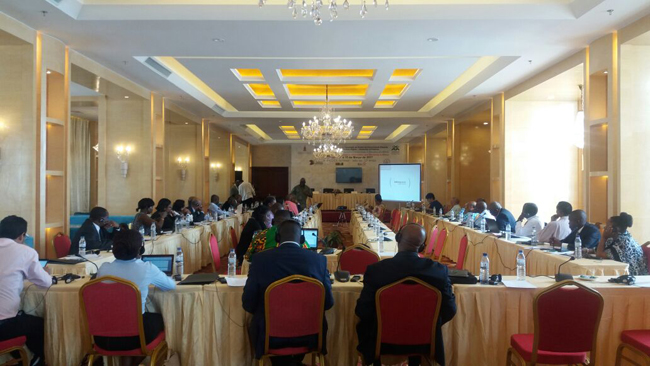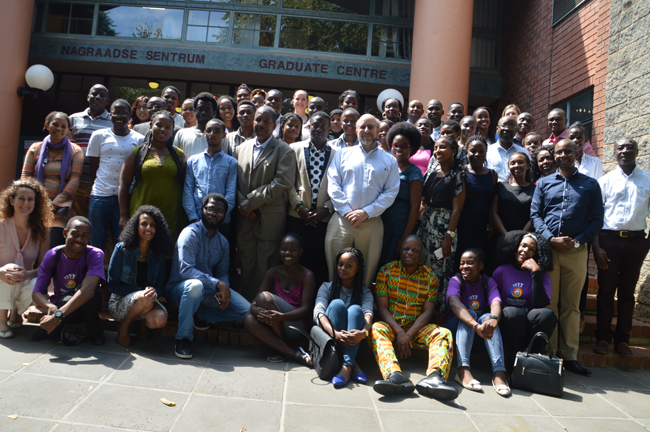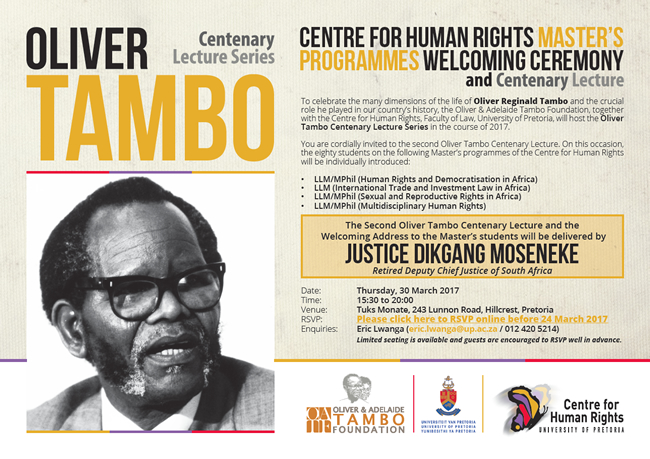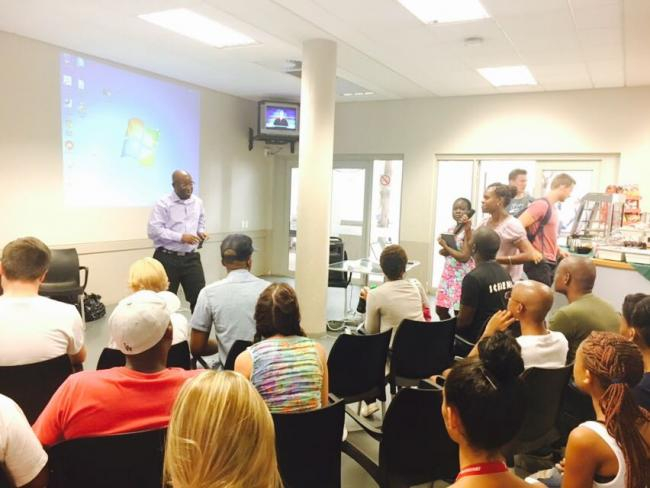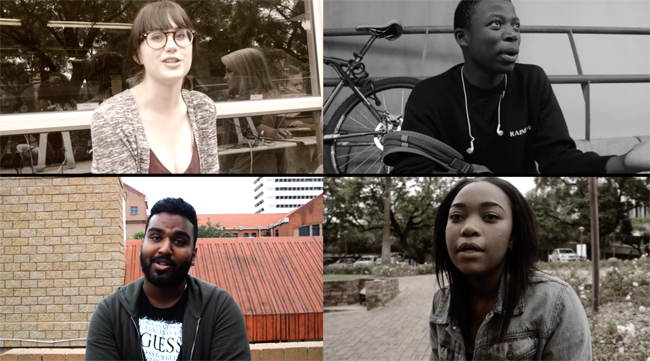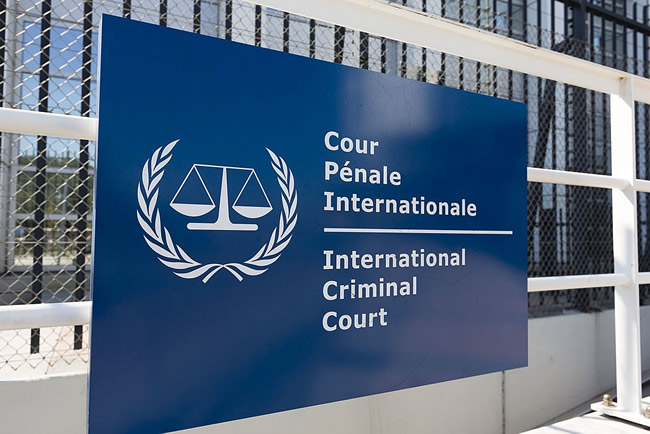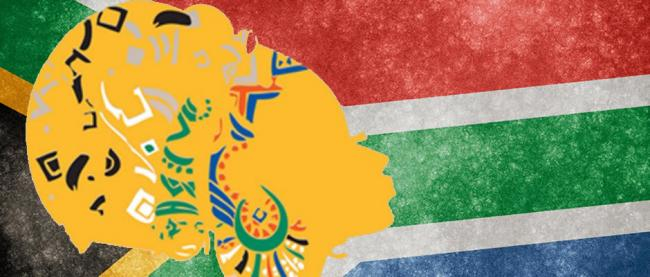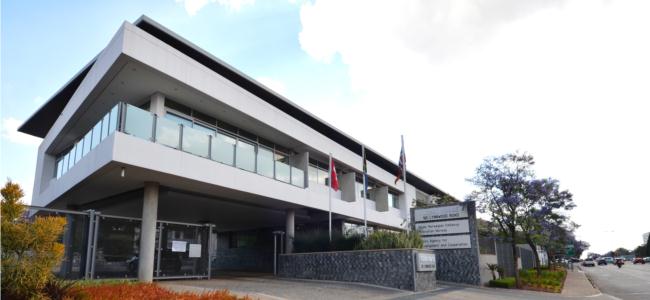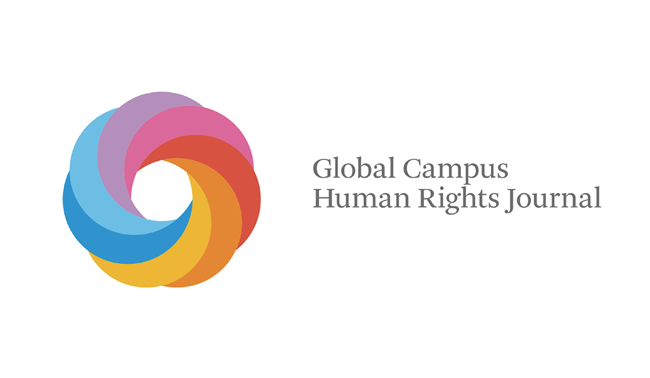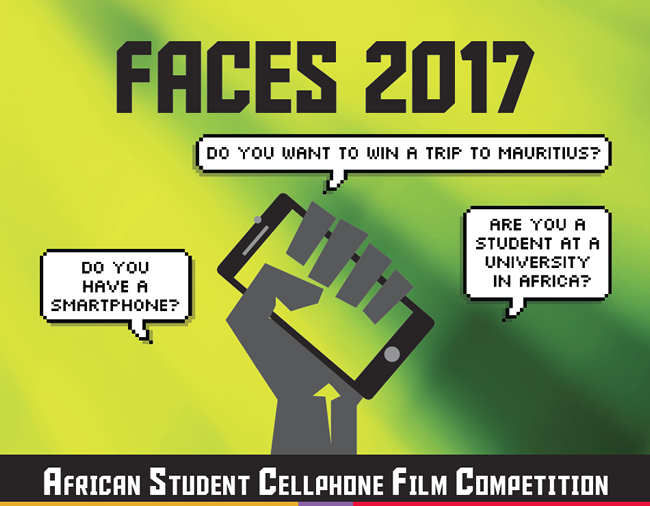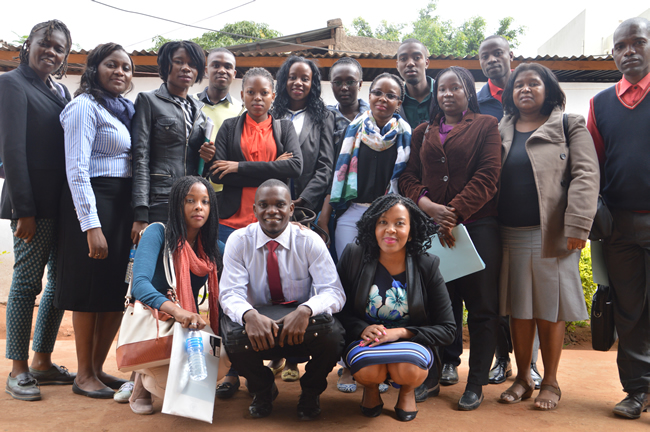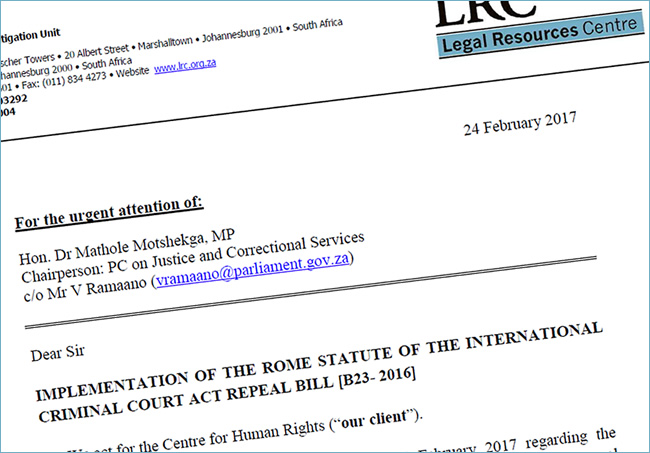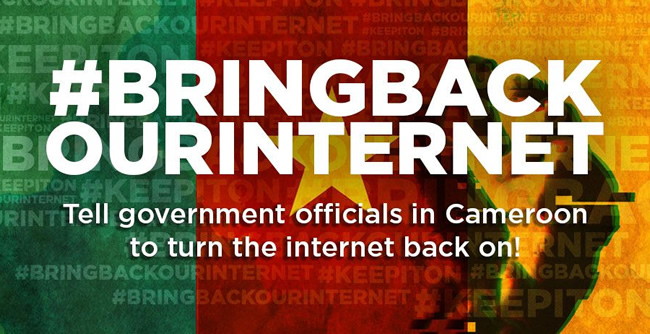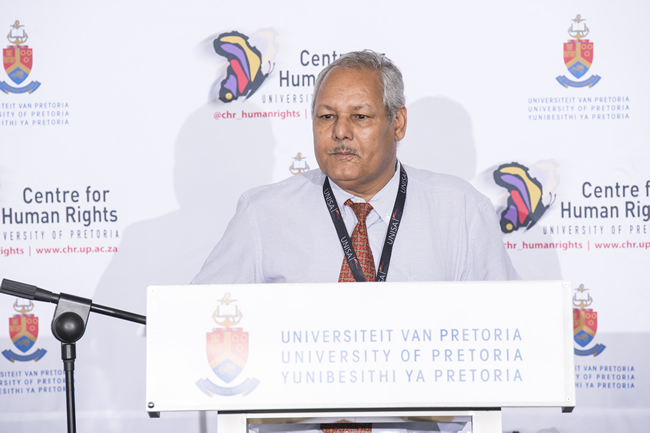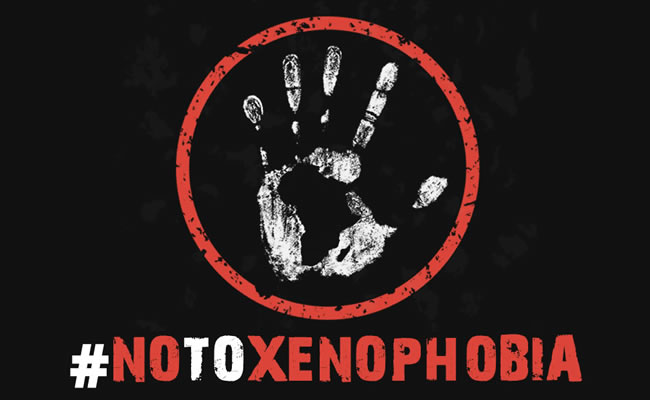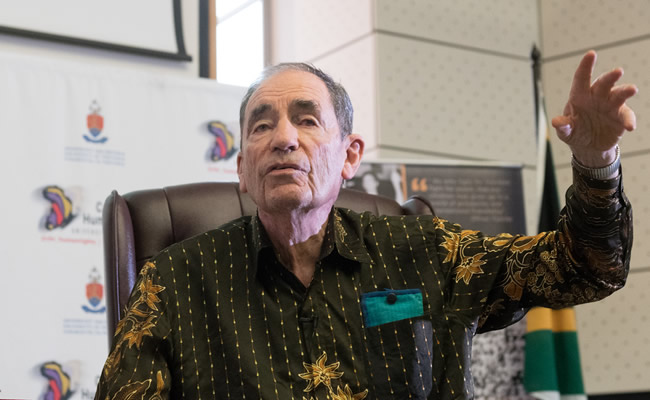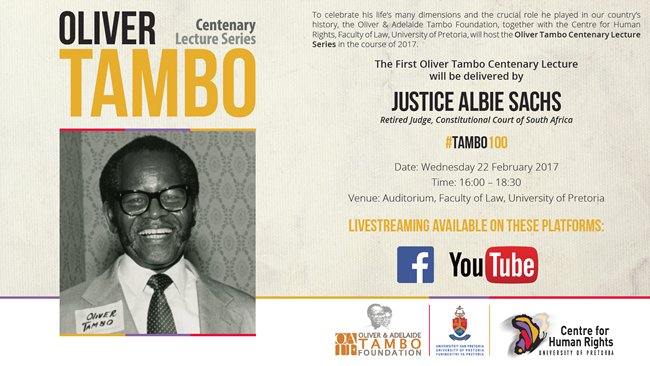- Details
The Centre for Human Rights received a delegation from the Human Rights Commission of Sierra Leone on 22 September to explore potential collaboration. The Human Rights Commission expressed interest in support in capacity building of commissioners and staff in particular in relation to disability rights, LGBTI rights, business and human rights, women's rights and complaints handling.
- Details
The Disability Rights Unit of the Centre for Human Rights (the Centre) on 21 September 2017 had a privilege of hosting a delegation of senior government officials from the Kingdom of Lesotho (Lesotho).
- Details
The Centre for Human Rights, University of Pretoria, and Pan Africa International Lesbian, Gay, Bisexual, Transgender, and Intersex Association (Pan Africa ILGA) strongly condemn the recent arrest of parents and NGO personnel at a training workshop on HIV prevention.
- Details
The African Human Rights Moot Court Competition is the largest gathering of students, academics and judges around the theme of human rights in Africa. This annual event brings together all law faculties in Africa, whose top students argue a hypothetical human rights case as if they were before the African Court on Human and Peoples’ Rights. The Competition aims to prepare a new generation of lawyers to argue cases of alleged human rights violations before the African Court.
- Details
On 11 September 2017, the Institute of International and Comparative Law in Africa at the University of Pretoria hosted a debate between Professor Dire Tladi and Dr Thompson Chengeta on whether the Government of South Africa’s decision to grant Grace Mugabe immunity is within the confines of the law. The debate was chaired by the Director of Centre for Human Rights, Professor Frans Viljoen.
- Details
The Centre for Human Rights, Faculty of Law, University of Pretoria hosted the Advanced Human Rights Short Course on Police Oversight and Accountability in Africa from 11 to 15 September 2017. The course brought together 33 participants from several countries across Africa with backgrounds that include: national human rights institutions, police officers, academia, civil society, legal practitioners, prosecutors and government.
- Details
In celebration of the International Save North Korean Refugees Day on the 22 nd of September 2017; Defense Forum Foundation, Free North Korea Radio , Centre for Human Rights, Africa Solidarity for Sahrawi and North Korea Freedom Coalition cordially invite you to a seminar titled: Human Rights in North Korea
- Details
Terms of Reference
Invitation to the 2017 Julius Osega Memorial Lecture (to be presented by Solomon Dersso in Ethiopia)
- Details
The Centre for Human Rights, Faculty of Law, University of Pretoria and the Faculty of Law, Addis Ababa University, cordially invites you to the Annual Julius Osega Memorial Lecture.
- Details
The 26th African Human Rights Moot Court Competition is organised by the Centre for Human Rights, University of Pretoria in collaboration with the University of Mauritius from 18 to 23 September 2017 in Réduit, Mauritius.
- Details
On Wednesday 9 August to Friday 11 August 2017, the Women's Rights Unit of the Centre for Human Rights (the Centre) took part in a three-day state reporting drafting workshop on the African Charter on Human and Peoples' Rights (African Charter) hosted by the Ministry of Justice in Zambia.
- Details
The Centre for Human Rights, Faculty of Law, University of Pretoria cordially invites you to a conference on advancing the right to access to justice and legal capacity for persons with disabilities in Africa which will be presented from 7 to 8 November 2017.
- Details
In its debut edition, FACES cellphone film competition recognized the short film by Miss Jane Choolwe Nsanzya as the winning entry. In addition to winning an all expense paid trip to Mauritius, Miss Nsanzya’s film titled “Ignorance isn’t bliss” will be screened during the 26th African Human Rights Moot Court Competition, taking place in Mauritius.
- Details
The Centre for Human Rights, Faculty of Law, University of Pretoria with the support of the Embassy of the Kingdom of the Netherlands, cordially invites you to apply for the Training Workshop on Strategic Advocacy and Litigation targeted at the promotion and protection of the human rights of lesbian, gay, bisexual and transgender persons for LGBT human rights defenders and activists in Africa.
- Details
The Centre for Human Rights on 6 September had the pleasure to host a delegation from the Sri Lanka Right to Information Commission (the Commission) on Wednesday 6 September. The delegation which comprised three Commissioners, the Director General as well as the Legal and Research Officer of the Commission met with the Director of the Centre for Human Rights, Prof Frans Viljoen and the head of the Access to Information (ATI) Unit, Dr Lola Shyllon.
- Details
On 29 and 30 August 2017, the Centre for Human Rights, University of Pretoria in collaboration with the Special Rapporteur on Freedom of Expression and Access to Information in Africa of the African Commission on Human and Peoples’ Rights (ACHPR), Commissioner Pansy Tlakula, organised a meeting of the members of the Working Group on the draft ‘Guidelines on Access to Information and Elections for Africa’ (Draft Guidelines).
- Details
The Centre for Human Rights, Faculty of Law, University of Pretoria (UP), hosted its Advanced Human Rights Short Course on The Right to Development in Africa from 21-25 August, 2017. The short course brought together more than 25 participants; from 15 countries across Africa and Europe, with backgrounds that include national human rights institutions, academia, NGO managers, government policy makers, civil society, independent community consultants, legal practitioners, state attorneys and diplomats.
- Details
This week is the Anti-Discrimination week at University of Pretoria. The Queer Space Collective(QSC), through this video contributes to the conversation on what discrimination means to the queer community at the University of Pretoria, and what the university management should include among its considerations while drafting the University of Pretoria Anti-Discrimination Policy. The QSC is an informal group of persons, departments and organisations with the vision to make the University of Pretoria safer and more inclusive of queer identity through creative writing and expression.
- Details
On 24 August 2017 the Centre for Human Rights hosted yet another cohort of Young African Leaders Initiative (YALI) Southern Africa scholars for an afternoon of discussions on violence against women and the rights of sexual and gender minorities.
- Details
The Faculty of Law at the University of Pretoria cordially invites all staff and students to presentations by specialists on anti-discrimination lawto co-incide with the UP Anti-discrimination week.
- Details
The Centre for Human Rights presented a capacity-building workshop on international human rights protection mechanisms in Zambia at the Intercontinental Hotel in Lusaka, Zambia, on 16 and 17 August 2017. The workshop was organised in collaboration with the University of Zambia, and was attended by more than 40 participants. Participants included Mr Likando Kalaluka (Attorney General of Zambia), Dr. Zonke Majodina (former member/chairperson of the Human Rights Committee) as well as legal officers and staff of various government institutions and ministries. Staff from the Zambian Human Rights Commission, the National Assembly of Zambia, Zambia Open University, Law Association of Zambia (LAZ), Centre for Human Rights, civil society organisations and the press were also in attendance.
- Details
The Centre for Human Rights, University of Pretoria is among four other universities across the world working with Amnesty International on its cutting-edge volunteer project Digital Verification Corps (DVC). Coordinated by Sam Dubberley, the DVC was created to equip students to subsequently support the work of Amnesty International’s researchers, who are often confronted with overwhelming volumes of unverified social media content in connection with some form of human rights abuse.
- Details
The Centre for Human Rights, Faculty of Law, University of Pretoria, through its Sexual Orientation, Gender Identity and Expression (SOGIE) Unit, applauds last week’s judgment by the High Court of South Africa Gauteng Local Division in Johannesburg, sitting as an equality court, in the matter of the South African Human Rights Commission v Jon Qwelane. The Court found that Qwelane’s derogatory comments about gays, published in 2008, constituted hate speech, and ordered him, within 30 days, to apologise unconditionally to the lesbian, gay and bisexual community.
- Details
The Centre for Human Rights, Faculty of Law, University of Pretoria, is currently presenting its Advanced Human Rights Course on The Right to Development in Africa, from 21 to 25 August 2017. The course is aimed at responding to the eternal question: ‘is development a human right’? What does it mean in the African context?
As part of the short course, the Centre hosted the Flemish Delegation to Southern Africa. The delegation was led by the Flemish Minister-President Hon Geert Bourgeois and Dr Geraldine Reymenants, General Representative of the Government of Flanders. Also present were representatives from the University of Pretoria: Prof Tiniyiko Maluleke (Special Advisor to the Vice-Chancellor of the University of Pretoria), Prof Andre Boraine (Dean, Faculty of Law, University of Pretoria) and Mr Norman Taku (Assistant Director, Centre for Human Rights).
![]() Download this statement
Download this statement ![]() Download the lecture by Hon Minister-President Geert Bourgeois
Download the lecture by Hon Minister-President Geert Bourgeois
- Details
- Details
The University of Pretoria is currently in the unique position where three law professors from the faculty of law serve as international experts on key UN bodies in Geneva, responsible for the development and application of international law.
According to the dean of the faculty of law, Professor Andre Boraine, such a concentration of international experts in one university is exceptional by any standard.
“Some – not even all – countries count themselves lucky if they have one person in these key UN positions: here we have three experts not only from one country but also from one university,” he said.
- Details
- Details
The Centre for Human Rights made a presentation before members of the Pan African Parliament Permanent Committte on Justice and Human Rights on the continued plight of persons with albinism on the continent and the need for regional action on 9 August 2017. The presentation is part of the Centre for Human Rights’ on-going efforts to advance the rights of persons with albinism in Africa which began in 2016. The presentation, which took place at the Pan African Parliament headquarters in Midrand, South Africa during the Justice and Human Rights Committee session sought to bring to the attention of the Committee members the continued persistent and egregious violations of the rights of persons with albinism. More importantly the need for African states to adopt the recently finalised Regional Action Plan on Albinism in Africa, a 5-year plan to address attacks and related violations against persons with albinism in Sub Saharan Africa.
- Details
Every year on 9 August, South Africa celebrates National Women’s Day in recognition of the role that women played in the liberation of the country from Apartheid. On 9 August 1956, over 20,000 women marched onto the Union Buildings in Pretoria protesting the Pass-Laws that restricted the movement of women of color in white areas to certain times of the day. The demonstration was a resounding success and is nationally recognised as one of the political milestones that marked the events that challenged the apartheid government to eventually usher in democracy in 1994. While National Women’s Day celebrates the courage of those women back in the day, it has also evolved into a day to promote women’s rights within the community and to call out government to act on unfulfilled promises to women in the country regarding rights such as freedom from violence perpetrated against women and girls.
- Details
The Centre for Human Rights held a capacity building workshop for members of the Pan African Parliament (PAP) on 5 August 2017. The workshop, which was held at the seat of PAP in Midrand, South Africa, was themed ‘Digital Rights, Democracy and Governance in Africa: The Role of National and Regional Parliaments. The Centre for Human Rights facilitated this workshop in collaboration with its partners- Applied Law and Technology (ALT) Africa, Association for Progressive Communications (APC) and Google.
- Details
The Centre for Human Rights, Faculty of Law, University of Pretoria, takes note of media reports and images circulating on social media, suggesting that the Deputy Minister of Higher Education, Mduduzi Manana, has been involved in a case of assaulting a woman in a public place (restaurant) over the weekend.
- Details
The Centre for Human Rights calls for the immediate release of the 42 persons who were unjustly arrested by law enforcement agents at the HIV awareness training for sexual and gender minorities which was held at the Vincent Hotel, Weigh Bridge in Owode Onirin, Lagos State, Nigeria on Saturday 29 July 2017.![]() Download this statement
Download this statement
- Details
On 2 August 2017, the Centre for Human Rights signed a technical cooperation agreement with African Men for Sexual Health and Rights (AMSHeR), establishing a framework for concrete collaboration on a number of activities. AMSHeR is a Pan-African coalition of organisations focusing on men who have sex with men (MSM) and lesbian, gay, bisexual and transgender persons (LGBT). AMSHeR works towards the promotion of non-discrimination, particularly based on sexual orientation and gender identity and the advancement of health services for MSM/LGBT persons in Africa. The signing ceremony was attended by AMSHeR’s Executive Director Kene Esom and law and human rights advocacy manager, Berry Didier Nibogora. The Centre was represented by its Director, Professor Frans Viljoen and Assistant Director Norman Taku.
- Details
The Women's Rights Unit, the SOGIE Unit and the Disability Rights Unit at the Centre for Human Rights is organising an advocacy event in commemoration of the National Women's day in South Africa. On the 9th of August 1956 more than 20 000 women of all races marched to the Union Buildings in Protest to amendments to the Pass Law and presented a petition against the idea of women carrying passes in urban areas.
- Details
The Centre for Human Rights, Faculty of Law, University of Pretoria, is currently hosting its third Advanced Human Rights Short Course on Children’s Rights in Africa. It started on Monday 31 July 2017 and runs to Friday 4 August 2017. The short course brings together 35 participants from 10 countries across Africa, with backgrounds that include national human rights institutions, academia, civil society, legal practitioners, prosecutors, teachers, medical professionals and government.
- Details
The Centre for Human Rights, University of Pretoria, hosted its second short course on business and human rights at the University of Pretoria from 10 - 14 July 2017. The event was made possible with support from the United Nations Office of the High Commissioner for Human Rights, Regional Office for Southern Africa. The short course brought together more than 55 participants, from 18 countries across Africa, with backgrounds that include national human rights institutions, academia, civil society, legal practitioners and government.
- Details
On Thursday 27 July 2017, Queer Africa 2: New stories made its grand entry into the University of Pretoria(UP) community at its well-attended book launch organised by the Queer Space Collective (QSC) at the Library Auditorium, University of Pretoria, Hatfield Campus. This was preceding earlier launches at the University of Witwatersrand, Cape Town and Oslo.
The force behind bringing Queer Africa 2: New stories home to UP, was the QSC’s vision to make the UP safer and more inclusive of queer identity and expression through creative writing and expressions. The QSC is an informal group comprising of individuals mostly from ten organisations representative of both themselves and their organisations. These organisations include: Student for Law and Social Justice; Up and Out; English Department and Drama Department of the University of Pretoria; Church World Services; Right to Care; Gay and Lesbian Memory in Action(GALA); Centre for Sexuality Aids and Gender; and the Centre for Human Rights. These organisations among other things engage actively at the core of their work with the issues of queerness and sexual and gender minority issues. Interestingly, individual membership of the QSC cuts across persons of various ages, races, sexual orientation, gender identities, nationalities and backgrounds working together through interdependence amongst members and member organisations to storm UP, to charm the UP space with the saturating consciousness of the need for equality, safety and inclusivity. The launch of Queer Africa 2: new stories is the Queer Space Collective’s maiden event.
- Details
The SA Federation for Mental Health (SAFMH) hosted the I Decide=I Am travelling art exhibition from the 17th to the 27th of July 2017 at its Randburg offices in Gauteng. The globally acclaimed exhibition by Bulgarian illustrator Nadezhda Georgieva and human rights activist Yana Buhrer tells the personal stories and reflections of sixteen people denied of their legal capacity because of their psychosocial or intellectual disability. The exhibition also includes three pieces by South African artist Daniel Mosako, based on his interpretation of the Life Esidimeni tragedy in which almost 100 persons with mental disabilities lost their lives.
- Details
The 9th Nelson Mandela World Human Rights Moot Court Competition concluded with the final round on 21 July 2017 at the Palais des Nations in geneva, Switzerland.
- The winning team of the 9th Nelson Mandela World Human Rights Moot Court Competition is the team that argued the case for the Applicant / Respondent, with 79.5%
The winning team from St Thomas University, Canada was represented by Abbie LeBlanc and Navy Vezina.
- The runner-up team of the 9th Nelson Mandela World Human Rights Moot Court Competition is the team that argued the case for the Applicant / Respondent, with 77.67 %.
The runner-up team from University of buenos Aires, Argenitina was represented by Carolina Lisandro Elias and Tomas Maria Ainchill.
- Details
The 9th Nelson Mandela World Human Rights Moot Court Competition is currently underway at the Palais des Nations, United Nations Geneva headquarters. After the submission of written memorials, 36 teams from 23 countries coming from the 5 United Nations regions progressed to the pre-final rounds that are held annually in the human rights capital of the world.
- Details
The following vacancies are available:
Terms of Reference
Project Title: State Parties' Compliance with the Concluding Observations and Recommendations issued by the African Commission on Human and Peoples Rights (ACHPR) on the Rights Enshrined in the Maputo Protocol
Organisation: The Centre for Human Right (CHR)
Job Title: Researcher
Duty Station: South Africa, Malawi, Nigeria (One position available per country)
Duration: Varied (Research paper based)
Contract Type: Individual consultant
Closing date: 31 July, 2017
- Details
The Queer Space Collective (an informal group with the vision of making the University of Pretoria safer and more inclusive of queer identity and expression through creative writing) invites you to the University of Pretoria launch of Queer Africa 2: New Stories. Join us for readings, performances and a Q&A session.
Queer Africa 2: New Stories is a ground breaking collection featuring twenty-six masterpieces from eight countries – Kenya, Nigeria, Rwanda, Sierra Leone, Somalia, South Africa, Uganda, and the United States of America. The plots of all twenty-six stories are separately and skilfully woven to reflect a vast range of human emotions and experiences that abound in the lives of Africans of all shades and colour at home and abroad who own the queer identity.
Date: Thursday 27 July 2017
Time: 17:00 - 18:30
Venue: Merensky Library Auditorium, University of Pretoria, Hatfield Campus
RSVP: PLACES LIMITED, PLEASE CLICK HERE TO RSVP ONLINE BEFORE MONDAY 24 JULY 2017
Contact: Mr David Ikpo ( david.ikpo@up.ac.za) / Pierre Brouard ( pierre.brouard@up.ac.za)
- Details
On 6 July 2017, the Centre for Human Rights hosted 5 beneficiaries and graduates (Jafta Bonginkosi, Shadrack Munyai, Xolilie Myeni, Miranda Mbonambi and Lisebo Kotelo) of the JB Marks Educational Trust Fund at the Faculty of Law, University of Pretoria.
- Details
Although the right to form civil society organisations and peaceful assembly and association are recognised by international legal instruments; civil society groups and activists continue to face threats and fall victim to oppression every day. The Centre for Human Rights, University of Pretoria hosted a three day intensive short course on Civil Society Law in Africa from 3-5 July 2017. The course brought together several participants from across Africa, mainly representing civil society groups, policy makers, government officials, national human rights institutions and academia.
- Details
The International Development Law Unit at the Centre for Human Rights, Faculty of Law, University of Pretoria cordially invites you to a public lecture on ‘The Doctrine of Odious Debt’ by Lee C. Buchheit
- Details
On Thursday, 22nd June, the Women’s rights unit and the Sexual Orientation and Gender Identity and Expression Unit (SOGIE) hosted YALI delegates at the Centre for Human Rights. This very memorable visit is part of a bi-annual collaboration between the Centre for Human Rights and the YALI Regional Leadership Center as led by the University of South Africa (UNISA). YALI aims to develop young African leaders in Business and Entrepreneurship Development; Civic Leadership; Public Management and Governance through a hybrid of innovative and complimentary learning approaches. The Centre lends its support in ensuring that the different groups of leaders are conversant in crucial human rights issues and are also aware of their responsibility as leaders to uphold these rights.
- Details
The HRDA Chronicles is out with a new episode. This time, the spotlight is on David Nnanna Ikpo, a 2016 graduate of the LLM/MPHIL in Human Rights and Democratisation in Africa. In this feature, you will get to discover how David is trying to make the world better with the stroke of his pen and through his recently published novel - Fimi Sile Forever
- Details
The Centre for Human Rights calls for urgent action to be taken by the University of Pretoria to engender a campus culture of non-violence and non-discrimination through the accelerated review of the University’s sexual harassment policy and the provision of comprehensive and accessible services for survivors of sexual violence. The University must also ensure that perpetrators of sexual violence and slanderous remarks that defame women are condemned and are held accountable for their actions.
- Details
The Centre for Human Rights congratulates Mr. Rashid Dumbuya – a graduate of its Masters Programme in Human Rights and Democratisation in Africa (class of 2013), upon his recent appointment as Commissioner of the Human Rights Commission of Sierra Leone.
Invitation: Trade and Investment Law Seminar Series (TILSS) - Speaker: Professor Babatunde Fagbayibo
- Details
The International Development Law Unit at the Centre for Human Rights, Faculty of Law, University of Pretoria cordially invites you to a seminar series titled “Trade & Investment Law Seminar Series (TILSS)”
- Details
The International Development Law Unit at the Centre for Human Rights, Faculty of Law, University of Pretoria cordially invites you to a seminar series titled “Trade & Investment Law Seminar Series (TILSS)”
- Details
We invite activists from the Global South to debate the challenges that the current context poses to human rights across the world.
Activists and defenders from the Global South can submit their applications to attend the 15th International Human Rights Colloquium, wich will be held from October 1 to 6, in Sao Paulo, Brazil.
- Details
The Centre for Human Rights, Faculty of Law, University of Pretoria and the Universidade Eduardo Mondlane – Faculty of Law, cordially invites you to the Annual Helen Kanzira Memorial Lecture.
The Keynote Address will be presented by: Her Excellency dr Isaura Nyusi, First Lady of Mozambique on ‘Sexual and Reproductive Rights of Women and Girls: Challenges on Maternal Health Rights’
- Details
The 5th Annual African Disability Rights Conference will be held from the 7th to the 8th of November 2017 at the Centre for Human Rights, University of Pretoria in South Africa. This year’s conference will focus on the following themes:
- a) the implications of the Convention on the Rights of Persons with Disabilities (CRPD) for the African region with particular reference to article 13, the right to access to justice and article 12, the right to equal recognition before the law;
- b) the development of mechanisms/strategies for the effective domestication and implementation of articles 12 and 13 of the CRPD and
- c) the interplay between article 13 and article 12 of the CRPD.
It is anticipated that papers presented at this conference will be reworked by authors and submitted for consideration for publication in the 2018 volume of the African Disability Rights Yearbook.
- Details
Madame Chair, Honourable Commissioners, the Centre for Human Rights welcomes the ongoing work of the Working Group on the Death Penalty and Extrajudicial, Summary or Arbitrary Killings in Africa to continue placing questions concerning the right to life, the supreme human right, high on the agenda of the African Commission.
- Details
The Centre for Human Rights earlier this year went though the process of recruiting a new Director, after the current Director's second term in that position had come to an end. However, the University’s selection committee did not shortlist any of the applicants.
The University Management subsequently decided that the University would fund a permanent position in the Centre of an Assistant Director, if the incumbent Director agrees to serve for another term. The Director (Frans Viljoen) happily agreed, and is looking forward to contribute further to advance the Centre’s vision.
We are now embarking on a process of recruiting a suitable person for the permanent full-time position of Assistant Director in the Centre.
This new position will be in addition to that of the current position of Assistant Director, which is funded by the Centre from external funds (held by Norman Taku). These developments reflect the Centre's thematic and institutional growth over thirty years.
- Details
Part of the work we do at the Gender Unit, Centre for Human Rights, University of Pretoria is to support the mandate of the Special Rapporteur on the Rights of Women in Africa especially with respect to the popularization as well as the implementation of the Maputo Protocol across Africa
One area of such support is specifically, with regards to state reporting as well as popularising the 2009 reporting guidelines on the Maputo Protocol.
- Details
On Tuesday the 9th of May 2017 Students for Law and Social Justice (SLSJ) - a student based civil society organization, worked with the Sexual Orientation, Gender Identity and Expression (SOGIE) Unit of the Centre for Human Rights at the University of Pretoria to produce an evening of engagement, conversation and debate centered around developments in the LGBTQIA+ sphere in Africa and the severe situation of violence, discrimination and oppression facing the LGBTQIA+ community in South Africa.
- Details
The Pretoria University Law Press (PULP), established in 2005 and located in the Centre for Human Rights, Faculty of Law, University of Pretoria, celebrated a landmark this week, as it launched its 175th publication. On 15 May 2017, PULP hosted Doctor Malcolm Langford, who co-edited the landmark The Optional Protocol to the International Covenant on Economic, Social and Cultural Rights: A Commentary (OP-ICESCR Commentary), recently published by PULP. Dr Langford is a renowned socio-economic rights scholar based at the Norwegian Centre for Human Rights.
The OP-ICESCR Commentary breaks new ground. It is the first and most comprehensive book of its kind. It offers rigorous scholarly commentary on the provisions of the OP-ICESCR, aimed at informing and encouraging research, reasoned argument, consistent interpretation and effective advocacy, adjudication and remedies under the Protocol. It also provides a critical resource for users of the Optional Protocol (applicants, lawyers, governments, the Committee) and a broader audience of scholars, students, national judiciaries and policy makers.
- Details
17 May is the International Day against Homophobia, Transphobia and Biphobia (IDAHOT), celebrated in more than 130 countries around the world.
The International IDAHOT Committee, founded in 2005 as an independent initiative, aimed at fighting against discriminations and injustices on the grounds of sexual orientation and/or gender identity or expression. This year, there is a special focus on families, including the role of families in the well-being of their LGBTIQ (Lesbian, Gay, Bisexual, Transgender, Intersex or Queer) members as well as respect for the rights of diverse LGBTIQ families.
- Details
At the recently concluded 29th Session of the African Committee of Experts on the Rights and Welfare of the Child (African Children’s Rights Committee) held in Lesotho, the Centre for Human Rights and RADDHO, an NGO based in Senegal, participated and presented a joint submission on the implementation of Committee’s decision in the decisions Centre for Human Rights and la Rencontre Africaine pour la Defense des Droits de l’Homme (on behalf of Senegales Talibés) v Senegal (Talibe case) ACERWC, Comm/001/2012, 15 April 2014.
This case deals with the conditions of some 100,000 children (called Talibés) who, while attending Koranic schools in Senegal, are required to beg on the streets of Dakar and other urban centres, to secure their own survival. The Centre for Human Rights and RADDHO submitted the case as far back as 2012.![]() Download this Press Statement
Download this Press Statement
- Details
STATEMENT BY NGO WITH OBSERVER STATUS: CENTRE FOR HUMAN RIGHTS, FACULTY OF LAW, UNIVERSITY OF PRETORIA
60th session of the African Commission on Human and Peoples’ Rights 11 May 2017, Niamey, Nigee![]() Download this Press Statement
Download this Press Statement
- Details
In 2015, a call reverberated through South African universities. It started at Wits, moved to UCT and then to most campuses in the country. Thousands of students, at nearly every institution of higher education, demanded the decolonisation of university curricula and the radical transformation of academic spaces. This resulted in a movement towards the rejection of Eurocentric systems of knowledge and the advancement of African approaches and philosophies.
To engage further on the issue of a decolonised education model, the Centre for Human Rights, Faculty of Law, University of Pretoria, hosted a lunch lecture by renowned critical legal scholar Professor Makau Mutua. Prof Mutua teaches law at the SUNY Buffalo Law School, State University of New York, in the United States of America (USA). The lecture on 'Decolonising the university curriculum' provided an opportunity for critical reflection on South Africa’s racial and political past, its impact on tertiary education and the way forward.
- Details
Over the past six months, the English-speaking part of Cameroon has experienced serious repression and continuous human rights violations. The crisis erupted in October 2016, following a series of sit-in strikes and non-violent actions initiated by common law lawyers and teachers’ trade unions in protest against the government’s policy of assimilation through the imposition of the civil law judges to preside over cases in common law courts and French-speaking teachers to teach in English schools. This policy seems designed to systematically wipe out the legal and education systems of the peoples of Southern Cameroons.
The government’s lethal response to the strikes and protest actions led to the death of at least 8 protesters on 8 December 2016, and subsequent extra-judicial killings, disappearances, rape, maiming, torture and other forms of degrading and inhumane treatment. Civil society organisations coordinating the strikes and protest actions were banned on 17 January 2017. Leaders, including Justice Ayah Paul Abine (Supreme Court Judge), Dr Felix Agbor Balla (prominent international human rights lawyer), Dr Neba Fontem (a university lecturer), Mr Mancho Bibixy (a civil rights activists), and hundreds of other activists and protesters were arrested and transferred to the nation’s capital, Yaoundé (a civil law jurisdiction). They are currently being tried in a military court on charges of terrorism, which carries a death penalty if found guilty. These actions violate the right to fair trial. This is happening in spite of the African Commissions’ ruling in the Kelvin Gunme v Cameroon (para 215(1)(ii)) forbidding the transfer of accused persons from the English-speaking part to be tried in the French-speaking part of the country.
- Details
GENEVA (3 May 2017) – The Government of Eritrea must free journalist Dawit Isaak who has been awarded a prestigious press freedom prize some 15 years after he was detained, a United Nations human rights expert says.
The Special Rapporteur on the situation of human rights in Eritrea, Sheila B. Keetharuth, is also calling on the authorities in Asmara to release unconditionally all others detained unlawfully.
“The Eritrean authorities should stop the practice of arrests and detention carried out without legal basis instantly,” said Ms. Keetharuth, welcoming the award of the UNESCO/Guillermo Cano World Press Freedom Prize 2017 to Mr. Isaak.
- Details
The Centre for Human Rights, Faculty of Law, University of Pretoria, expresses deep concern about the treason charge Zambia’s opposition party leader Hakainde Hichilema is facing.
The Centre is deeply concerned about the serious recent ethnic tensions in Zambia, which appear to be politically motivated and to be part of an orchestrated campaign by sections of senior level politicians seeking to earn political dividends at the expense of peace in the country.
Hichilema faces two charges, one for obstructing President Edgar Lungu’s motorcade, and another for treason, which is a non-bailable offence. Treason is an extremely serious offence, for which the maximum penalty is the death penalty.
- Details
kiki* with Panti (*A gathering of people for a casual chat, laughter, and at times serious discussions. May involve locked doors, tea and gossip.) In conversation with Rory O'Neill (aka Panti Bliss, performer, writer, mentor, and LGBTIQA+, HIV and human rights activist)
Event Details
Date: Thursday 18 May 2017
Time: 14:30 - 16:00
Venue: Conference Room 100, UP (Hatfield Campus)
RSVP: johan.maritz@up.ac.za by 15 May 2017
GENEVA (3 May 2017) – The Government of Eritrea must free journalist Dawit Isaak who has been awarded a prestigious press freedom prize some 15 years after he was detained, a United Nations human rights expert says.
The Special Rapporteur on the situation of human rights in Eritrea, Sheila B. Keetharuth, is also calling on the authorities in Asmara to release unconditionally all others detained unlawfully.
“The Eritrean authorities should stop the practice of arrests and detention carried out without legal basis instantly,” said Ms. Keetharuth, welcoming the award of the UNESCO/Guillermo Cano World Press Freedom Prize 2017 to Mr. Isaak.
Dawit Isaak, who is 52 and a playwright, journalist and writer, moved to Sweden in 1987, where he later became a citizen. He returned to Eritrea only after independence in 1993 and was one of the founders and reporters of Setit, the first independent newspaper in the country.
Mr. Isaak was arrested in September 2001 during a political crackdown on the so-called G-15, a group of politicians, and journalists critical of Government policies. Some were detained and tortured, others disappeared. The last known sighting of Mr. Isaak was in 2005. His whereabouts now are unknown.
“The case of Mr. Isaak is emblematic of all those who have been subjected to enforced disappearances by the Government of Eritrea and remain unaccounted for,” said Ms. Keetharuth.
The Special Rapporteur recalled the findings of the UN Commission of Inquiry on Human Rights in Eritrea, which concluded that there were reasonable grounds to believe that Eritrean officials had committed crimes against humanity, including the crime of enforced disappearance, in a persistent, widespread and systematic manner since 1991.
“The Government of Eritrea has an obligation to urgently provide information on the fate and whereabouts of all those deprived of physical liberty. This would be a first and long-overdue indication that the Government is committed to rebuilding trust with the Eritrean people,” Ms. Keetharuth said.
“By allowing independent monitors immediate and unhindered access to all places of detention, official and unofficial, the Government would send a strong signal that it acknowledges human rights violations of the past, while taking steps to improve the situation on the ground now.
“The arrests of Dawit Isaak and his fellow journalists remain the most visible sign of repression of freedom of expression. The Eritrean authorities continue to stifle all forms of expression that could be perceived as critical of the Government and its policies,” she said.
Ms. Keetharuth reaffirmed that freedom of expression was a basic human right, and a free press one of the tenets of a democratic society, providing a valuable check on potential excesses by government.
Ms. Sheila B. Keetharuth (Mauritius) was appointed as the first Special Rapporteur on the situation of human rights in Eritrea in October 2012. From 2014 to 2016, she also served as a member of the Commission of Inquiry on Human Rights in Eritrea. Since May 2014, Ms. Keetharuth is an expert member of the Working Group on Extractive Industries, Environment and Human Rights Violations of the African Commission on Human and Peoples’ Rights. Until 2012, Ms. Keetharuth was the Executive Director of the Institute for Human Rights and Development in Africa in Banjul, The Gambia. She also worked with Amnesty International in Kampala, Uganda, and as a lawyer and broadcaster in Mauritius. In 2017, Ms. Keetharuth was awarded with the Outstanding Alumni Achievement Award by the University of Leicester, in recognition of her human rights work.
Special Rapporteurs are part of what is known as the Special Procedures of the Human Rights Council. Special Procedures, the largest body of independent experts in the UN Human Rights system, is the general name of the Council’s independent fact-finding and monitoring mechanisms that address either specific country situations or thematic issues in all parts of the world. Special Procedures’ experts work on a voluntary basis; they are not UN staff and do not receive a salary for their work. They are independent from any government or organization and serve in their individual capacity.
- See more at: http://www.ohchr.org/en/NewsEvents/Pages/DisplayNews.aspx?NewsID=21571&LangID=E#sthash.rFwqqqsA.dpuf- Details
In view of strengthening the mandate of the Special Rapporteur on the Rights of Women in Africa (SRRWA), the Gender Unit of the Centre for Human Rights (CHR) organised a three-day refresher workshop on increasing states capacity for reporting under the Protocol to the African Charter on Human and Peoples’ Rights on the Rights of Women in Africa (the Maputo Protocol) in the Kingdom of Lesotho. The workshop was held in collaboration with the Ministry of Law and Constitutional Affairs.
- Details
What is unique about Africa’s approach to international law? What would be the features of such an approach? This is some of the questions a group of forty international law scholars from across Africa and the diaspora asked themselves at a Round Table hosted by the Centre for Human Rights, Faculty of Law, University of Pretoria, on 3 and 4 May 2017.
The Round Table was convened under the theme ‘African approaches to international law’. During the Round Table the concept of an “African approach” was problematized, with participants agreeing that this notion should not be racially or culturally based, but spatially, or in terms of one’s methodological ‘orientation’.
One of the participants was Professor Makau wa Mutua, who is well known for his critical scholarship, and for having been instrumental in launching a school of anti-hegemonic thinking on international law, Third World Approaches to International Law (TWAIL). He emphasized the ‘African’ origins of TWAIL and contended that it has much to offer to African scholars critically engaged with international law.
- Details
The Open Society Foundations (OSF) in collaboration with the Centre for Human Rights (CHR) launched the Disability Rights Scholarship Programme (DRSP) in 2011. The CHR through the Disability Rights Unit has played a significant role of coordinating the DRSP which has included: marketing the programme, receiving applications, shortlisting semi-finalists and hosting the interviews of the shortlisted semi-finalists.
In 2016 the Open Society Foundation as the funder of the DRSP extended its funding and introduced for the first time an Inclusive Education Scholarship Programme (IESP), also in collaboration with the CHR.
DRSP and IESP are open to disability rights advocates, lawyers, and educators who are interested in the development of new legislation, jurisprudence, policy and research that will harness the innovations and opportunities offered by the domestication of the United Nations Convention on the Rights of Persons with Disabilities (CRPD). For the 2017 programme those applying for the programmes had to be citizens of Mozambique, Kenya, Malawi, Sudan, South Sudan, Tanzania, Tunisia, or Uganda at the time of application.
- Details
The Centre for Human Rights cordially invites all interested stakeholders attending the NGO Forum preceding the 60th Ordinary Session of the African Commission on Human and Peoples’ Rights in Niamey, Niger, to its presentation of a proposed Draft Model Law on Intersex Persons Rights in Africa. The objective of the meeting is to share the idea of the Model Law, get your views and devise a possible strategy of getting the Model Law adopted and implemented.
Intersex persons continue to face unfair discrimination based on their natural biological sex characteristics. With the exception of a few African countries there is no law that mentions or protects the rights of intersex persons. The Centre for Human Rights anticipates that this Model Law will address the gap in national legislation and assist African States in developing national laws, policies and institutions to protect the rights of all intersex persons. The Model Law will also act as a tool for advocating for law reform and stronger legal recognition and protection of fundamental rights and freedoms of intersex persons in Africa.
- Details
The Centre for Human Rights, Faculty of Law, University of Pretoria cordially invites you to a brown bag lunch lecture on decolonising the university curriculum by distinguished critical legal scholar, Professor Makau Mutua.
- Details
The Centre for Human Rights joins the rest of South Africa to celebrate Freedom Day 2017. On 27 April 1994, there was a major shift in South Africa’s trajectory with the first non-racial post-apartheid election being held in the country. Twenty three years ago, by this symbolic exercise, apartheid and oppression were formally rejected and South Africa resolved to ensure democracy and equality. This Freedom Day milestone was preceded by the struggle, bloodshed, purposefulness, hard work and the resilience of the people of South Africa. However, it is pertinent to note that the celebration of Freedom Day is South Africa’s victory just as much as it is the victory of Africa and the world. In Nelson Mandela’s speech at the 1995 Freedom Day celebration, he stated that Freedom Day marks a ‘transition from a history of oppression to a future of freedom.’ While revelling in our glorious past on a day like today, South Africa’s present and tomorrow are equally to be reflected upon and attended to.
- Details
On 24 April 2017, the Centre for Human Rights hosted its first consultative meeting on the Model Law on the rights of intersex persons in Africa. The meeting gathered together intersex rights activists in South Africa, coming from the following organisations: Iranti, AIDS Rights Alliance of Southern Africa (ARASA), Open Society Initiative for Southern Africa (OSISA), Transgender Intersex Africa (TIA) and OUT Well-Being. Also in attendance was John Chigiti from Gender Minorities Action Trust Foundation-Kenya (GMAT), who has represented intersex persons before the Kenyan courts.
The purpose of the meeting was to validate the Draft Model Law on intersex persons, which the Centre for Human Rights is currently drafting for eventual tabling at the African Commission on Human and Peoples’ Rights. The Draft Model Law seeks to prevent unfair discrimination and to protect and promote of the rights of intersex persons in African countries.
- Details
Delegates to a symposium on land, heritage and human rights gathered in Pretoria for an urgent dialogue.
They heard that a human rights approach to land redistribution, grounded in the effective implementation of Section 25 of the 1996 Constitution of South Africa, can still guarantee a life of dignity, equality and freedom for all South Africans. This was the view expressed by Prof. Bongani Majola, Chair of the South African Human Rights Commission. Prof Mathole Motshekga, Chair of the Parliamentary Portfolio Committee for Justice and Correctional Services, agreed with this sentiment, adding that Parliament has not done enough to effectively make use of the possibilities allowed for under Section 25 of the Constitution, to adopt enabling legislation.
- Details
The right to life is often described as a supreme human right, but it is clearly under pressure worldwide.The Centre for Human Rights, University of Pretoria for the first time hosted its first annual short course on the right to life from 10-13April 2017. The course brought together several participants from across Africa, mainly representing civil society, national human rights institutions, police officers, prosecutors and academia.
- Details
The Community Law Centre at the Kara Heritage Institute, the Nelson Mandela Metropolitan University (George Campus) and the Centre for Human Rights, University of Pretoria cordially invites you to a symposium on land, heritage and human rights.
![]() Download Section 25 of the Constitution of the Republic of South Africa (Property)
Download Section 25 of the Constitution of the Republic of South Africa (Property)
- Details
Since graduating from the Centre in 1998 with his LLM degree, Mr Melron Nicol-Wilson has been an outstanding ambassador of the Centre's values of excellence and ubuntu, through his work as a human rights defender in Sierra Leone and abroad.
Melron Nicol-Wilson is an alumnus of a unique and distinguished pedigree. He joined the Centre in 1998, with academic distinctions from Fourah Bay College and the Sierra Leone Bar School where finished second in a class of 22. In the course of his LLM studies here, he demonstrated a synthesis of intellectual aptitude, the capacity for rigorous study and an indelible personal commitment to improving the lives of others with the instrument of law.
- Details
“The [Maputo] Protocol stands as a comprehensive instrument that demonstrates the good will of African States to end all forms of violence against women… Notwithstanding that, our role as women has been fraught with challenges and circumstances of vulnerability”. First Lady of Sierra Leone Her Excellency Mrs Sia Yama Koroma, rightly noted as she gave the Keynote address at a state reporting workshop that was hosted by the Gender Unit in Freetown from 22-24 March 2017. She was speaking at the opening ceremony which also saw the awarding of the first Extraordinary Vera Chirwa Award to the Chief Justice of Sierra Leone Honourable Justice Abdulai Hamid Charm, an alumnus of the Centre for Human Rights, for his contribution to human rights in Sierra Leone.![]() Download the introduction to Chief Justice Charm on receiving the first Extraordinary Vera Chirwa Award
Download the introduction to Chief Justice Charm on receiving the first Extraordinary Vera Chirwa Award
- Details
Dr Anastacia Tomson, medical doctor, author and transgender rights activist, weighs in on International Transgender Day of Visbility and states that 'visbility is no longer enough'
I always have mixed feelings over International Transgender Day of Visibility, which is observed annually on 31 March. Do not get me wrong; I am a believer in visibility. I live as visible a life as I can, because I believe in the power of representation, and I believe in spreading understanding and awareness, especially where trans issues are concerned.
But I also recognise that visibility is a privilege. And that visibility does not stop the violence. Trans people continue to be shamed, threatened or hurt. We are thrown out of our homes. We lose our jobs. All too often we lose our lives.
For me to be able to stand up and say “I’m transgender, and I’m out, and that’s ok” reflects the massive chasm between different groups. My visibility can be scary to me sometimes, because it’s a form of exposure or vulnerability. But, even so, my life is probably not at risk. Because of the colour of my skin, because of the job I have, because of the area I live in. Because I have access to medical care, and because I was able to acquire legal documents that accurately reflect my identity.
- Details
Sheila B. Keetharuth wins Outstanding Alumni Achievement Award for human rights work in Africa
Issued by University of Leicester Press Office 27 March 2017
The University of Leicester has recognised the outstanding contribution of one of its alumni to exposing and protecting against human rights abuses worldwide. This year’s winner of the University’s Outstanding Alumni Achievement Award is Sheila B. Keetharuth, in recognition of her human rights work and her determination to provide a voice to the powerless. She was presented with the award at the University’s Alumni Association’s Black Tie Dinner on 16 March before an audience of nearly 500 alumni and guests in the Grand Connaught Rooms in London’s Covent Garden.
- Details
“It is not about power, it is about purpose.” In his Keynote Address at the Second Oliver Tambo Centenary Lecture, Justice Dikgang Moseneke pre-empted Oliver Tambo’s response to the current leadership challenges that the African continent is facing.
Through his activism over the decades, lawyer, revolutionary and politician, Oliver Reginald Tambo left an indelible impression on South Africa and its new Constitution. In celebration of his legacy, the Centre for Human Rights, Faculty of Law, University of Pretoria together with the Oliver & Adelaide Tambo Foundation, hosted the second in a series of Oliver Tambo Centenary Lectures and the welcoming ceremony for the students of the Centre’s four Master’s programmes on Thursday 30 March 2017. The students that were welcomed at the event are studying towards the following degrees: LLM/MPhil in Human Rights and Democratisation in Africa (HRDA), LLM in International Trade and Investment Law in Africa (TILA), LLM/MPhil in Multidisciplinary Human Rights (Multi) and LLM/MPhil in Sexual and Reproductive Rights in Africa (SRRA).
- Details
On 14 and 15 March 2017, the Centre for Human Rights, University of Pretoria and the Centre for Human Rights, Eduardo Mondlane University in collaboration with the Special Rapporteur on Freedom of Expression and Access to Information in Africa (Special Rapporteur), Commissioner Pansy Tlakula, organised a consultation on the draft ‘Guidelines on Access to Information and Elections for Africa’ (Draft Guidelines).
- Details
Reflections by a participant of the Disability Rights in an African Context short course hosted by the Centre for Human Rights from the 13-17 March 2017
As I skimmed through the programme for the short course “Disability Rights in an African context” last week, the varied themes on the agenda conjured up the prospect of five days of enlightening discussions and profound reflection. On Monday, as I made my way to the classroom, several thoughts flashed through my mind: that of my late grandmother’s dread for the wheelchair after she underwent a partial foot amputation, that of the bullying of my autistic friend in primary school and the account of my parent’s agony on learning of my diagnosis of severe clubfoot at birth. During the introductory session, whilst the participants shared their interest in and expectations from the course and invoked disturbing details about disability abuse in their respective countries, the enduring obstacles to furthering disability rights across Africa dawned on me. The dearth of visibility of disability – disability being somewhat shunned in my home country Mauritius - had probably clouded my appreciation of the magnitude of the challenges lying ahead. Professor Ngwena’s words echoed, setting the tone for the week: we should look beyond the letter of the UN Convention on the Rights of Persons with Disabilities and seek to address the implementation gap in the continent.
- Details
The Centre for Human Rights, Faculty of Law, University of Pretoria, together with the Oliver & Adelaide Tambo Foundationcordially invites you the Centre for Human Rights Master's Programmes Welcoming Ceremony and Oliver Tambo Centenary Lecture Series. The second edition of this series of lectures will be delivered by Justice Dikgang Moseneke, Retired Deputy Chief Justice of South Africa.
On this occasion, the eighty students on the following Master’s programmes of the Centre for Human Rights will be individually introduced:
- LLM/MPhil (Human Rights and Democratisation in Africa)
- LLM (International Trade and Investment Law in Africa)
- LLM/MPhil (Sexual and Reproductive Rights in Africa)
- LLM/MPhil (Multidisciplinary Human Rights)
- Details
On March 21 1960, the residents of Sharpeville took to the streets in protest of the oppressive laws the Apartheid government imposed on black people. In terms of these laws black people had to carry passes in order to move around the country. These laws reinforced the notion that being black was bad and that black people were subhuman. The Government of the time retaliated by opening fire on the crowd leading to the deaths of many people that day, all because they stood for their human rights to social inclusion and freedom of movement. It is their courage that we celebrate on March 21st (Human Rights Day).
- Details
As part of its advocacy efforts against Xenophobia, the Centre for Human Rights randomly approached students at the Hatfield campus of the University of Pretoria to share their thoughts on the recent xenophobic attacks targeted at African foreigners in South Africa. In this video, the students speak about the beauty in diversity and the need for tolerance.
- Details
The Centre for Human Rights, Faculty of Law, University of Pretoria, takes note, with satisfaction, of the South African government’s revocation of its ‘Instrument of Withdrawal’ in line with the decision of the North Gauteng High Court of 22 February 2017. In its decision, the High Court found that the deposit of South Africa’s ‘Instrument of Withdrawal’ was unconstitutional because Parliament’s approval for withdrawal from the Statute of the International Criminal Court (ICC Statute) was not sought or obtained. The Court ordered the government to revoke its withdrawal notice, which it has now done.![]() Download this press statement
Download this press statement
- Details
In commemorating International Women’s Day with the UN theme focusing on “Women in the Changing World of Work: Planet 50-50 by 2030,” the Centre for Human Rights, Faculty of Law, the University of Pretoria, welcomes the nomination of Justice Mandisa Muriel Lindelwa Maya as the President of the Supreme Court of Appeal. She has extensive experience having served in the Constitutional Court, Supreme Court of Appeal, the Labour and the High Court. If Justice Maya’s nomination gets confirmed, she would become South Africa’s first woman President of the Supreme Court of Appeal. This would be ground breaking and a major step in ensuring that women are represented equally in the judiciary and in achieving gender equality.![]() Download this press statement
Download this press statement
- Details
Invitation to Tender: Evaluation of grant agreement beteween the Norwegian Government and the Centre for Human Rights, Faculty of Law, University of Pretoria
The Centre for Human Rights, Faculty of Law, University of Pretoria, invites tenders for an Evaluation of a Grant by the Norwegian Government to the Centre for Human Rights, Faculty of Law, University of Pretoria. In this process, it will target at least three specific potential tenderers, and will further widely disseminate this `Invitation to Tender’.
- Details
The Global Campus of Human Rights is proud to announce the launch of the Global Campus Human Rights Journal (GCHRJ) , a peer-reviewed online publication serving as a forum for rigorous scholarly analysis, critical commentaries, and reports on recent developments pertaining
to human rights and democratisation globally.
- The first issue is now available online at https://globalcampus.eiuc.org/human-rights-journal
GCHRJ is edited by a team of three, led by Prof Frans Viljoen, Director of the Centre for Human Rights and Professor in the Faculty of Law at the University of Pretoria in South Africa, who is assisted by two co-editors: Vahan Bournazian, Professor at Yerevan State University in Armenia, and Matthew Mullen, Lecturer at Mahidol University of Bangkok in Thailand. They are supported by an International Editorial Advisory Board.
- Details
Students from all countries in Africa are invited to participate in the FACES 2017: African student cellphone film competition. The Competition is part of the 26th African Human Rights Moot Court Competition, due to be held in Mauritius from 18 - 23 September 2017. The winning entries will be screened at the Moot Court Competition.
The closing date for FACES 2017 is 31 July 2017 (deadline extended).
![]() Download the FACES 2017 Poster
Download the FACES 2017 Poster![]() Download the FACES 2017 Official Rules (English)
Download the FACES 2017 Official Rules (English)![]() Download the VISAGES 2017 Official Rules (French)
Download the VISAGES 2017 Official Rules (French)
Submit your entry online (Deadline: 31 July 2017)
The purpose of the Competition is to encourage students from Africa to express themselves and to engage with issues of relevance to Africa, using available cellphone technology, and the enhance the Moot Court experience.
One student from the University of Pretoria, and one student from another university in Africa, will win a trip to screen their video at the Moot Court Competition in Mauritius.
- Details
The Eduardo Mondlane University is one of several leading African Universities that partner with the Centre for Human Rights, University of Pretoria, in the execution of the Disability Rights Law Schools Project sponsored by the Open Society Foundation.
At Eduardo Mondlane University, disability rights teaching has been incorporated into the human rights module for both undergraduate and postgraduate students. There is also an active clinic group that takes up cases of discrimination against persons with disability as well as carry out vigorous sensitization visits in communities.
Following a support visit held in 2016 by the Disability Rights Unit of the Centre for Human Rights, a video was produced to highlight some of the incredible work being done by students and their lecturers/supervisors in advancing the rights of persons with disability in Mozambique. Watch below:
- Details
(On 22 February 2017 the Centre for Human Rights welcomed the judgment of the Full Bench of Gauteng Division, Pretoria, in the matter of Democratic Alliance v Minister of International Relations and Cooperation and Others (case no. 83145/16). The CHR, represented by the Legal Resources Centre, was joined as a party to the proceedings by the applicant for its interest in the matter. Read the joint statement with the LRC here.)
- Details
The Centre for Human Rights, University of Pretoria is gravely concerned about the on-going human rights violations, particularly of the right to freedom of expression in the North West and South West regions of the Republic of Cameroon (English-speaking Cameroon).
Since 17 January 2017, internet connections have been completely shut down in English-speaking Cameroon, reportedly on the orders of the Ministry of Communications. This action is an apparent attempt to suppress the use of social media to mobilise the mass protests that have taken place in English-speaking Cameroon since November 2016. The Centre for Human Rights had on 17 February, expressed concern about the deteriorating human rights situation in English-speaking Cameroon, sighting ‘reports of arbitrary arrests, abductions, extra-judicial killings, involuntary disappearances, rape, torture and inhumane treatment of detainees, trial of civilians by military tribunals, shut down of internet services and the shutdown of schools’.
- Details
With Morocco’s re-entry into the African Union (AU) earlier in 2017, important questions around the self-determination of the people of the Sahrawi Arab Democratic Republic (SADR) have taken centre stage again. To answer some of these questions, the Centre for Human Rights, University of Pretoria, together with the Embassy of the SADR in South Africa, hosted a panel discussion on Monday 27 February 2017.
The event brought together ambassadors, members of the diplomatic corps, students, academics and representatives of state authorities, under the theme ‘Self-determination delayed: The Sahrawi Arab Democratic Republic’. The panel consisted of Ambassador Radhi Bachir (Ambassador to South Africa from the SADR), Ambassador Ghulam Asmal (Director: NEPAD and Partnerships in the South African Department of International Relations and Cooperation (DIRCO)) and Mr José Nascimento (Practitioner and international law expert).
![]() Download this press statement
Download this press statement![]() Download Ambassador Radhi Bachir's address
Download Ambassador Radhi Bachir's address
- Details
Recognising that South Africa has experienced xenophobic violence on numerous occasions on a scale which has been unprecedented in its democratic history, South Africa needs to recognise and strengthen those policies and laws which will promote tolerance and cater for appropriate sanctions for perpetrators of xenophobia. The last years have seen frequent attacks against refugees and migrants living in South Africa. We are reminded that between 2000 and 2008 close to 67 people died due to what became identified as xenophobic attacks in South Africa.[1] In May 2008, 62 people were killed and 600 sustained injuries as a result of xenophobic attacks.[2]Twenty-five of those killed were South Africans who were mistakenly believed to be non-nationals. Since 2009, the number of attacks against refugees and migrants in South Africa escalated reaching an average of between two and three attacks annually. In April 2015 at least 5 people died and about 5000 others were displaced when there was an outbreak of xenophobic attacks in the KwaZulu Natal province. During the 2015 attacks, at least 5 people were killed. Last week foreign nationals in Pretoria faced another wave of violent attacks. As in the past, these attacks caused loss of lives, injury, loss of livelihood and irreparable damage to property.
- Details
Through his activism over the decades, lawyer, revolutionary and politician – Oliver Reginald Tambo – left a lasting impression on South Africa and its Constitution. In celebration of his legacy, the Centre for Human Rights, Faculty of Law, University of Pretoria together with the Oliver & Adelaide Tambo Foundation, hosted the first in a series of Oliver Tambo Centenary Lectures on Wednesday 22 February 2017.
The event brought together students, academics and members of civil society to pay homage to Tambo’s life. Attendees were welcomed by the University’s Chancellor, Professor Wiseman Nkuhlu. Former Mayor of Ekhuruleni, Duma Nkosi – who played an instrumental role in the official renaming Johannesburg International Airport in Tambo’s honour – was also present.
![]() Click here to download this Press Statement
Click here to download this Press Statement
![]() Click here to download the text version of the Oliver Tambo Centenary Lecture by Justice Albie Sachs
Click here to download the text version of the Oliver Tambo Centenary Lecture by Justice Albie Sachs![]() Click here to watch the Oliver Tambo Centenary Lecture by Justice Albie Sachs on YouTube
Click here to watch the Oliver Tambo Centenary Lecture by Justice Albie Sachs on YouTube
- Details
The Centre for Human Rights (CHR), Faculty of Law, University of Pretoria, welcomes today’s judgment of the Full Bench of Gauteng Division, Pretoria, in the matter of Democratic Alliance v Minister of International Relations and Cooperation and Others (case no. 83145/16). The CHR, represented by the Legal Resources Centre, was joined as a party to the proceedings by the applicant for its interest in the matter.
![]() Download this press statement
Download this press statement![]() Centre calls for extension of due date for submissions on ICC withdrawal
Centre calls for extension of due date for submissions on ICC withdrawal
- Details
The Centre for Human Rights, Faculty of Law, University of Pretoria, together with the Oliver & Adelaide Tambo Foundation is hosting the Oliver Tambo Centenary Lecture Series. The first edition of this series of lectures is by Justice Albie Sachs, Retired Judge of the Constitutional Court of South Africa, at 16:00 SAST on Wednesday 22 February 2017.
The lecture will be livestreamed on the Centre for Human Rights YouTube Channel and on its Facebook page.
Click here to watch live on YouTube
Visit the Centre for Human Rights Facebook page
- Centre for Human Rights expresses serious concern over human rights situation in Cameroon and calls on government to end human rights violations
- SOGIE Unit celebrates outstanding LGBTI icons in South Africa
- Invitation: Oliver Tambo Centenary Lecture Series | Justice Albie Sachs (22 February 2017)
- The Centre for Human Rights condemns the arrests of gay rights activists in Tanzania and calls upon the government of Tanzania to desist from intimidating LGBTI human rights defenders

